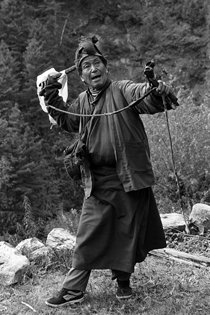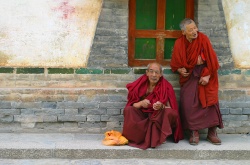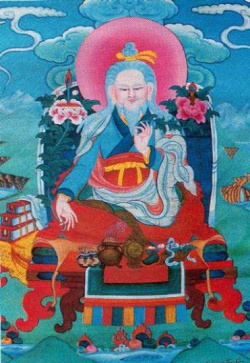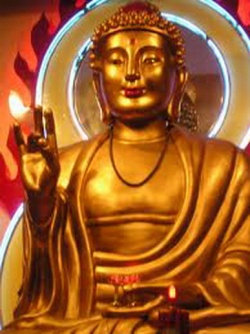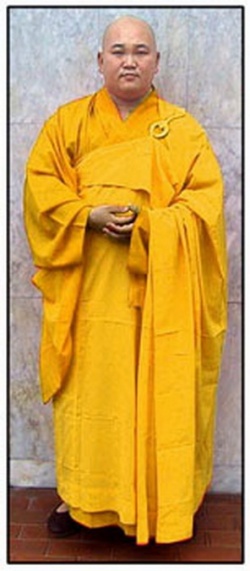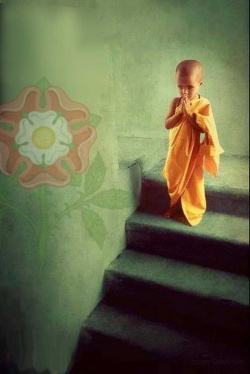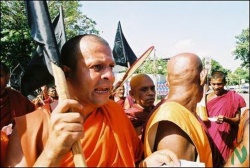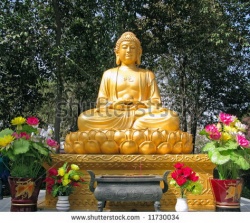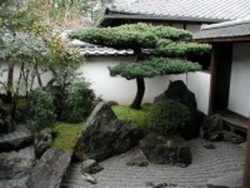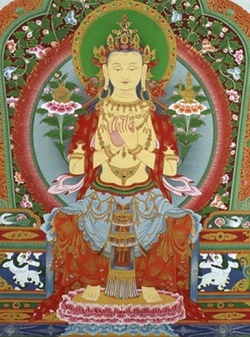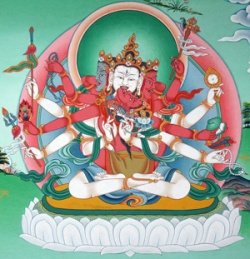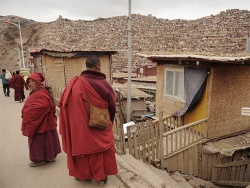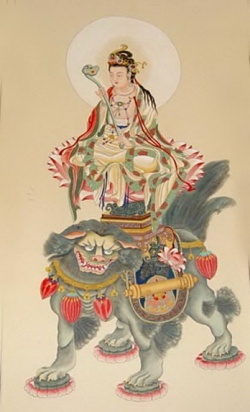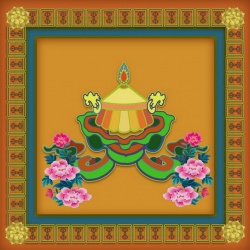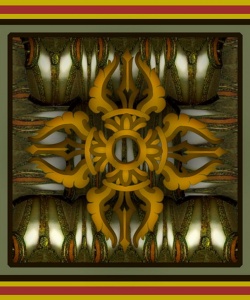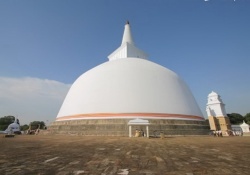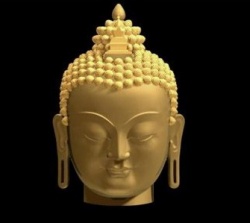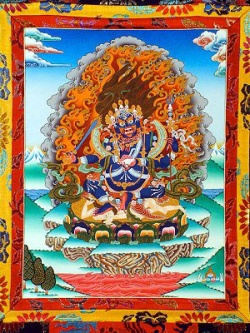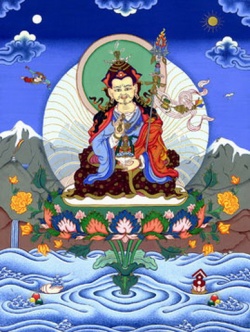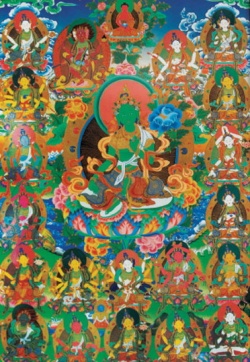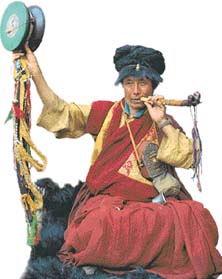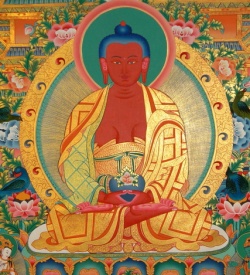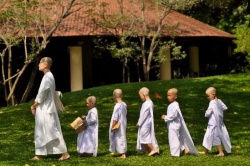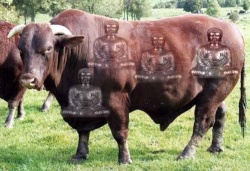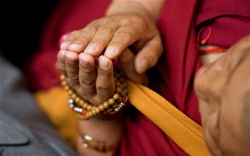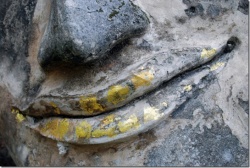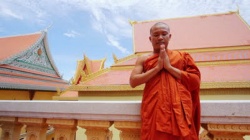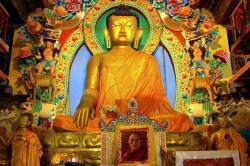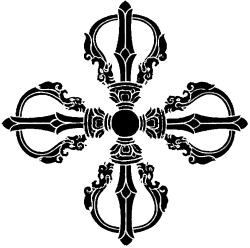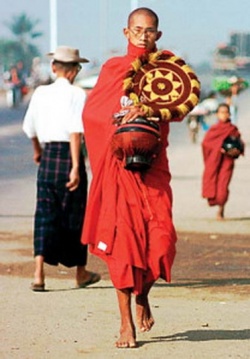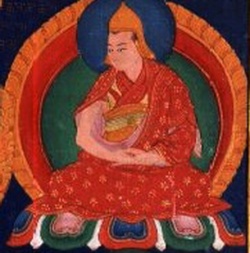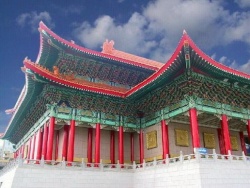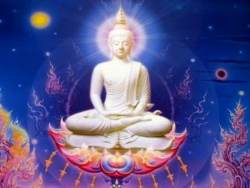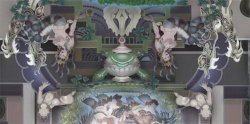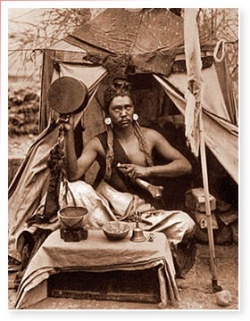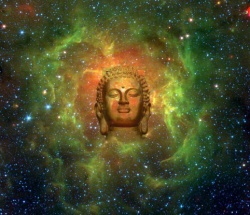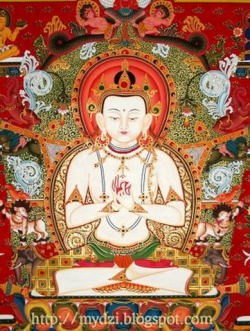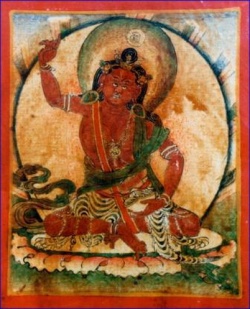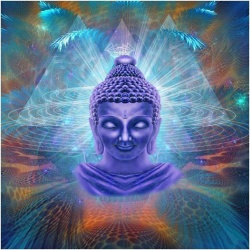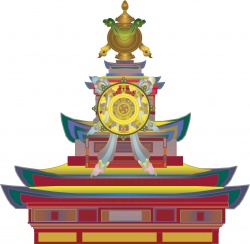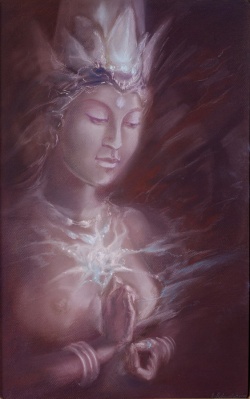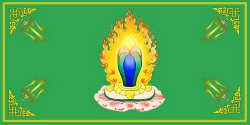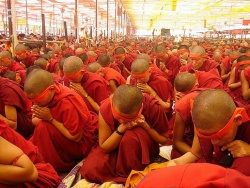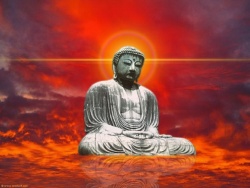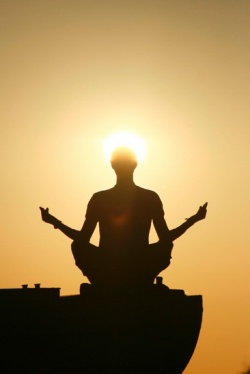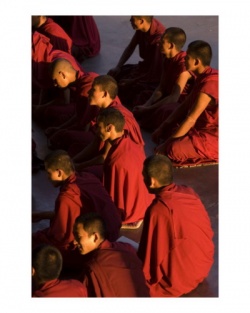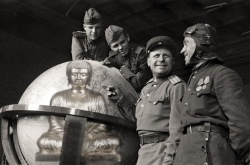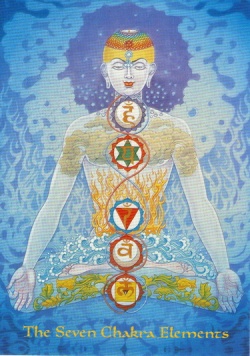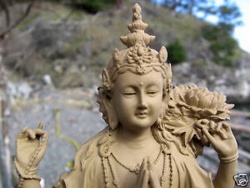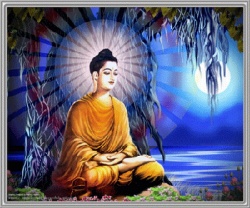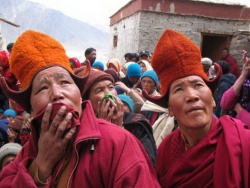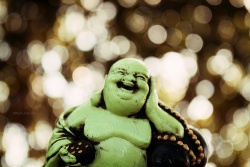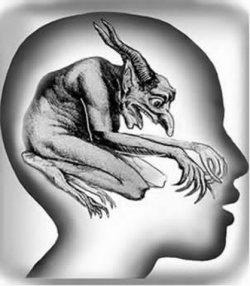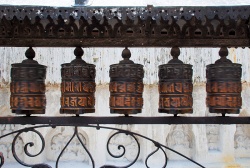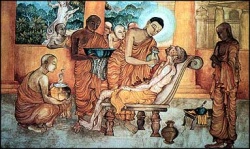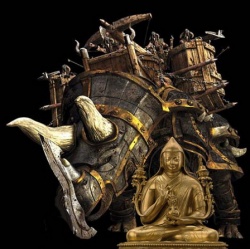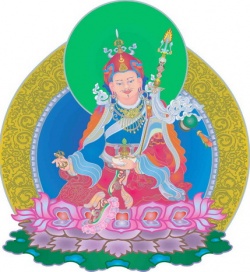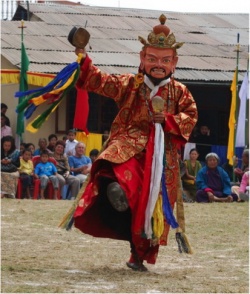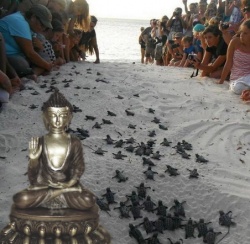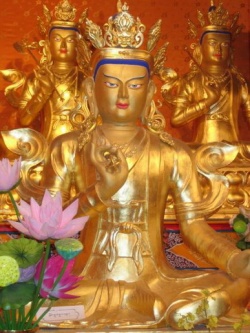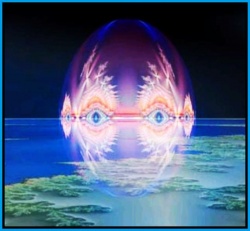Flower Adornment Sutra: The Ten Grounds
The Great Means Expansive Buddha Flower Adornment Sutra
Chapter Twenty-Six
The Ten Grounds
Translated in the Tang Dynasty by the Tripitaka Master Shramana Shikshananda of Khotan
At that time, the World Honored One was in the royal palace in the heaven of the comfort from others’ transformations, in the hall of treasuries of mani jewels, together with a gathering of great Bodhisattvas. All these Bodhisattvas, who were irreversible from anuttarasamyaksambodhi, had assembled from the worlds of the other directions. They dwelt in the states of wisdom in which all Bodhisattvas dwell. They had entered in the place of wisdom which all Bodhisattvas dwell. They had entered the place of wisdom which all Thus Come Ones enter, and diligently practiced without rest. They were well able to manifest all kinds of spiritual penetrations, and all that they did to teach, transform, tame, and subdue living beings was done at the right time. In order to accomplish all Bodhisattvas’ great vows, in all worlds, in all kalpas, in all lands, they diligently cultivated all practices, without slacking even momentarily They were replete with a Bodhisattva’s blessing and wisdom, the aids to the way, by which they universally benefited living beings without shirking. They had arrived at the ultimate shore of a Bodhisattva’s wisdom and expedients.
They manifested entry into birth and death as identical with Nirvana, yet they did not renounce the cultivation of Bodhisattva practices. They were skilled at entering all Bodhisattvas’ dhyanas, liberations, samadhis, samapattis, spiritual penetrations, and clear knowledges. In all they did, they obtained comfort. They acquired all Bodhisattvas’ comfortable spiritual powers, and in an instant, without movement or exertion, they could go to the assemblies of all Thus Come Ones’ Bodhimandas, act as leaders of the assembly, and request the Buddha to speak Dharma.
They protected and upheld the Buddhas’ Proper Dharma wheel. They used a vast, great mind to make offerings to and serve all Buddhas. They always diligently practiced the deeds which all Bodhisattvas practice. Their Bodies universally appeared in all worlds. Their voices reached throughout the Dharma Realms of the ten directions. Their minds’ wisdom was unobstructed. They universally saw the merit and virtue of all Bodhisattvas of the three periods of time. They had already cultivated and obtained perfection. In ineffably many kalpas, they could not completely be described.
Their names were: Vajra Treasury Bodhisattva, Jeweled Treasury Bodhisattva, Lotus Treasury Bodhisattva, Virtue Treasury Bodhisattva, Treasury of Lotus Virtues Bodhisattva, Sun Treasury Bodhisattva, Treasury of Surya Bodhisattva, Treasury of Undefiled Moons Bodhisattva, Treasury of Adornments Universally Manifesting in all Countries Bodhisattva. Treasury of Vairocana Wisdom Bodhisattva, Treasury of Wonderful Virtues Bodhisattva, Treasury of Chandana Virtues Bodhisattva, Treasury of Flower Virtues Bodhisattva, Treasury of Kusuma Virtues Bodhisattva, Treasury of Utpala Virtues Bodhisattva, Treasury of Heavenly Virtues Bodhisattva, Treasury of Blessings and Virtues Bodhisattva, Treasury of Unobstructed Pure Wisdom’s Virtue Bodhisattva, Treasury of Merit and Virtues Bodhisattva, Treasury of Narayana Virtues Bodhisattva, Treasury of Non-defilement Bodhisattva, Treasury of Freedom From Filth Bodhisattva, Treasury of Versatile Eloquence Adornments Bodhisattva, Treasury of Great Bright-Light Nets Bodhisattva, Treasury of Pure, Awesome Virtues’ Light King Bodhisattva, Treasury of Gold Adornments and The Light of Great Merit and Virtues King Bodhisattva, Treasury of Adornments of All Marks’ Pure Virtues Bodhisattva, Treasury of Vajra Blazing Virtues and Adorning Marks Bodhisattva, Treasury of Blazing Light Bodhisattva, Treasury of Light Illumination Constellation King Bodhisattva, Treasury of Empty Space and Unobstructed Wisdom Bodhisattva, Treasury of Unobstructed Wondrous Sounds Bodhisattva, Treasury of Dharani Merit and Virtues to Maintain the Vows of Living Beings Bodhisattva, Treasury of Sea Adornments Bodhisattva, Treasury of Sumeru Virtues Bodhisattva, Treasury of Purity of Merit and Virtues Bodhisattva, The Thus Come One’s Treasury Bodhisattva, Treasury of the Buddhas’ Virtues Bodhisattva, Moon of Liberation Bodhisattva and all the other numberless, limitless, boundless, incomparable, uncountable, indescribable, inconceivable, illimitable, and ineffable multitudes of Bodhisattvas, Mahasattvas, with Vajra Treasury Bodhisattva as their leader.
At that time, Vajra Treasury Bodhisattva received the Buddhas’ spiritual power and entered “The Bodhisattvas’ Great Wisdom Light Samadhi.” After he entered that Samadhi, in each of the ten directions were worlds beyond the number of fine motes of dust in ten million Buddhalands, each of which contained Buddhas to the number of fine motes of dust in ten million Buddhalands, all bearing the same name, “Vajra Treasury.”
All those Buddhas appeared before him and said, “good indeed, good indeed, Vajra Treasury, that you are able to enter this Bodhisattvas’ Great Wisdom Light Samadhi. Good man, this is due to the combined aid of Buddhas throughout the ten directions to the number of fine motes of dust in ten million Buddhalands. It is also due to the power of the basic vows and the awesome spiritual might of Vairocana, Thus Come One, Arhat, of Right and Equal Enlightenment. And it is due to the power of your supreme wisdom. They wish to cause you to have the light to speak all inconceivable Buddhadharmas for all Bodhisattvas, that is, to bring about entry into the ground of wisdom; the gathering in of good roots; the skillful selection of Buddhadharmas.”
“Vast knowledge of all Dharmas; skillful ability to speak Dharma; purification of undiscriminating wisdom; non-defilement of all worldly Dharmas; purification of world-transcending good roots; obtaining inconceivable state of wisdom; obtaining all wisdom and entry to states of wisdom.”
“They also wish to bring about obtaining of Bodhisattvas’ ten grounds from beginning to end: an accurate speaking of the distinctive characteristics of the Bodhisattvas’ ten grounds.”
“Following and being mindful of all Buddhas’ dharmas; cultivating, studying, and discriminating non-outflowing dharmas; cleverly adorning through the light of great wisdom of skillful selection and contemplation; skillful entering the door of decisive wisdom; according to dwelling places manifesting in sequence and speaking without fear; obtaining the light of unobstructed eloquence; dwelling on the ground of great eloquence and having skillful decisiveness; being so mindful of the Bodhisattvas that one never forgets them; maturing all the realms of living beings; being able to pervasively to go to all places and be sure to be enlightened.”
“Good man, you should eloquently discuss these distinctions of d Dharma doors and good and clever methods, which is to say, receiving the Buddhas’ spiritual power, to be aided by the Thus Come Ones’ light of wisdom; to purify one’s own good roots; to universally purify the Dharma Realms; to completely gather in living beings; to deeply enter the dharma body and the wisdom body; to receive all Buddhas’ anointment of one’s crown; to obtain the tallest, largest body in all worlds; to transcend all worldly ways; to purify world-transcending good roots; to perfect the wisdom of all-wisdom.”
At that time the Buddhas of the ten directions bestowed upon Vajra Treasury Bodhisattva a peerless body; bestowed unobstructed eloquence of delight in speech; bestowed skillfully discriminating pure wisdom; bestowed the power of good memory and non-forgetfulness; bestowed skillfully decisive wisdom of understanding; bestowed the wisdom to reach all places and become enlightened; bestowed the power of ease in accomplishing the way; bestowed the Thus Come Ones’ fearlessnesses; bestowed those of all wisdoms’ wisdom of eloquence to contemplate and discriminate all dharma doors; bestowed all Thus Come Ones’ perfected, superior, wonderful adornments of body, speech, and mind. And why? Because, upon obtaining this Samadhi, the dharma is that way; because of the arisal from past vows; because of profound thought being well-purified; because of the wheel of wisdom being well-purified; because of aids of the way being well-accumulated; because of what one does being well-cultivated; because of mindfulness of one as a limitless dharma vessel; because of knowledge that one has pure faith and understanding; because of flawless maintaining and upholding being obtained; because of skillful application of the seal of wisdom of the Dharma Realm.
At that time, all the Buddhas of the ten directions extended their right hands and rubbed Vajra Treasury Bodhisattva on the crown. After they had rubbed his crown, Vajra Treasury Bodhisattva arose from Samadhi and told all the assembly of Bodhisattvas, “Disciples of the Buddha, all Bodhisattvas’ vows are well-decided. They are unadulterated, imperceptible, vast and great like the Dharma Realm, ultimately like empty space, exhausting the boundaries of the future. These Bodhisattvas pervade all Buddhalands and rescue and protect all living beings. They are protected by Buddhas. They enter the grounds of wisdom of all Buddhas of the past, the future, and the present. ”
“Disciples of the Buddha, what are the grounds of wisdom of the Bodhisattvas, Mahasattvas? Disciples of the Buddha, the grounds of wisdom of the Bodhisattvas, Mahasattvas, are of ten kinds, which all Buddhas of the past, the future, and the present have spoken, will speak and are speaking. I also speak them thus.”
“What are the ten? One, the Ground of Happiness; two, the Ground of Leaving Filth; three, the Ground of Emitting Light; four, the Ground of Blazing Wisdom; five, the Ground of Invincibility; six, the Ground of Manifestation; seven, the Ground of Traveling Far; eight, the Ground of Immovability; nine, the Ground of Good Wisdom; ten, the Ground of the Dharma Cloud.”
“Disciples of the Buddha, these ten grounds have been explained, will be explained, and are being explained by all Buddhas of the three periods of time. Disciples of the Buddha, I have not seen any Thus Come Ones in any Buddhalands who do not speak these Ten Grounds. And why? They are the Bodhisattvas’ Mahasattvas’ most superior path to Bodhi. They are also doors of pure dharma light, namely, the detailed explanation of all Bodhisattvas’ grounds. Disciples of the Buddha, this place is inconceivable, namely the wisdom accordingly certified to by Bodhisattvas. ”
At that time, after Vajra Treasury Bodhisattva had finished speaking the names of the Ten Grounds, he remained silent and did not further distinguish them. Thereupon, all the assembly of Bodhisattvas, upon hearing the names of the Bodhisattvas’ Ten Grounds, but not hearing their explanation, all looked up in thirst and had this thought, “What is the cause, and what is the reason, that Vajra Treasury Bodhisattva only speaks the names of the Bodhisattvas’ Ten Grounds yet does not explain them?” Moon of Liberation Bodhisattva, knowing what was being thought by all those in the great assembly, used verses to question Vajra Treasury Bodhisattva, saying:
“Why is it that the pure enlightened one, replete with mindfulness, wisdom, and virtue, speaks of the superior, wondrous grounds, yet with power to do so still does not explain them?
You have decisiveness and judgment, are courageous and are not weak-willed; why do you only name the grounds, without going on then to discuss them?
The wonderful doctrines of the grounds, all those assembled wish to hear; their minds show no trace of cowardice, they wish you to speak them in detail.
The multitudes assembled are all pure, devoid of laxness, stern they are and clear, able to be solid and unmoving, with merit, virtue, wisdom, all endowed.
Mutually they look to you in reverence, all of them intent with upward gaze, like bees that are mindful of their honey, like thirsty people thinking of sweet dew.”
At that time, the Greatly Wise and Fearless Bodhisattva, Vajra Treasury, having heard what was said, and wishing to make the assembled multitudes happy, for all disciples of the Buddha, used verses and said:
“The deeds of Bodhisattvas’ grounds of practice, are sources most supreme of Buddhas all; clear discussion of them in detail is foremost, rare, and hard to come upon.
Their subtleties are difficult to see, apart from thought, they go beyond the mind; the states and realms of Buddhas that appear; cause those who hear to be confused and doubt.
If one holds the mind like Vajra, with deep faith in the Buddhas’ foremost wisdom, knowing that the mind-ground lacks a self, one can hear these d Dharmas most supreme.
Like pictures that are painted in the air, like traces of the wind in empty space, the wisdom of the muni is that way, its distinctions very hard for one to see.
I am mindful that the wisdom of the Buddhas is superior beyond conception; there’s no one in the world who can receive it.
Silent, then, am I and do not speak.”
At that time, when Moon of Liberation Bodhisattva heard this said, he addressed Vajra Treasury Bodhisattva, saying, “Disciple of the Buddha, the multitudes are already gathered here. They all have well purified the depths of their minds and have well cleansed their thoughts. They have well cultivated many practices. They have well accumulated the aids to the path. They have been well able to draw near hundreds of thousands of millions of Buddhas. They have accomplished limitless good roots of merit and virtue. They have cast off all stupidity and doubt. They have no defilements. They have deep faith and understanding. Within the Buddhadharmas , they do not follow other teachings. All is well, disciple of the Buddha; you should receive the Buddhas’ spiritual power and speak. All these Bodhisattvas will be able to certify as knowing all these profound places. ”
At that time, Moon of Liberation Bodhisattva, wishing to restate his meaning, spoke verses, saying:
“We wish you to speak of the most tranquil, Bodhisattvas’ practices unsurpassed, discriminating each and every ground, wisdom pure, and accomplishment of proper enlightenment.
This assembly is free from all defilements; their determination and understanding are bright and pure. They have served limitless Buddhas. They can know the meaning of these grounds.”
At that time, Vajra Treasury Bodhisattva said, “Disciples of the Buddha, although the assembly gathered here, all have well purified their thoughts, have cast off stupidity and doubt, and in the deeply profound Dharma they do not follow others’ teachings, there are still other living beings with deficient wisdom, who, upon hearing these profound and difficult-to-conceive-of matters, would give rise to more doubts, and, in the long night, they would suffer much distress. I take pity upon them and, therefore, remain silent.”
At that time, Vajra Treasury Bodhisattva, wishing to restate his meaning, spoke verses, saying:
“Although these multitudes have pure, vast wisdom, and their profound and sharp understanding can make decisive choices, their minds unmoving like the king of mountains, and cannot be overturned, like the great sea.
There are those who have not practiced long nor yet understood, they practice with consciousness, not with wisdom. Hearing this they will doubt and fall into bad paths. I take pity on them and, therefore, do not speak.”
At that time, Moon of Liberation Bodhisattva again addressed Vajra Treasury Bodhisattva, saying, “Disciple of the Buddha, I hope you will receive the Buddhas’ spiritual power and explain in detail these inconceivable d Dharmas. These people should obtain the Thus Come Ones’ protection and mindfulness and give rise to faith and receptivity. And why? When one explains the Ten Grounds, the d Dharma of all Bodhisattvas is that way: that they obtain the Buddhas’ protection and mindfulness. Because they obtain the Buddhas’ protection and mindfulness, they can be courageous about these grounds of wisdom. And why? These are the Bodhisattvas’ most initial practices for accomplishing all Buddhas’ Dharmas.
Just as written words which say numerous things are based upon an alphabet, in that alphabet is fundamental to them and none of them departs from it in the slightest, so too, disciple of the Buddha, all Buddhas’ Dharmas are based upon the Ten Grounds in that the Ten Grounds are fundamental to them. Through successful cultivation of them, one obtains all wisdom. Therefore, disciple of the Buddha, I wish you would explain them. These people will certainly be protected by the Thus Come Ones and caused to believe and receive these Dharmas.”
At that time, Moon of Liberation Bodhisattva, wishing to restate his meaning, spoke verses, saying:
“Good indeed, disciple of the Buddha, I wish you would proclaim all the grounds of practice to approach and enter Bodhi; of all the comfortable Honored Ones throughout the ten directions, none is not proactive of and mindful of the basic roots of wisdom.
Secured in them, that wisdom is also fundamental; all the Buddhas’ Dharmas are produced from them; just as written words are comprised by alphabets, so, too, the Buddhas’ Dharmas are based upon these grounds.”
At that time, all the assembly of great Bodhisattvas, simultaneously and with a single sound, spoke verses to Vajra Treasury Bodhisattva, saying:
“You of superior, wondrous wisdom undefiled, of boundless, discriminating eloquence, please proclaim profound and wonderful words, interactive with the foremost meaning.
You who mindfully maintain pure practices, and are replete with virtues from Ten Powers, with eloquence to discriminate the meanings, please explain the most superior grounds.
With Samadhi and precepts joined to form upright thought, free from arrogance as well as deviant view, this assembly has no doubts in mind, and only wants to hear them well explained.
As one thirsty thinks of icy water, as one hungry dreams about good food, as one sick reflects on wholesome medicine, as a bee is greedy for good honey.
So, too, do we in just that way, wish to hear these Dharmas of sweet dew.
Good, indeed, one of wisdom vast and great, please tell us how to enter the Ten Grounds, accomplishing Ten Powers without obstruction, and the well-gone ones’ practices, one and all.”
At that time, the World-Honored One, from between his eyebrows, emitted a pure light, named “Blazing Light of Bodhisattvas’ Powers,” with hundreds of thousands of asamkhyeyas of lights as its retinue, which universally illumined all the worlds throughout the ten directions, pervading absolutely everywhere. The sufferings of the three ve vil paths all ceased to be. It also illuminated the assemblies of all Thus Come Ones, manifesting all Buddhas’ inconceivable powers. It also illuminated the persons of all Bodhisattvas speaking d Dharma with the aid of all Buddhas throughout all worlds in the ten directions. When finished doing that, it formed a great platform of nets of clouds of light high in empty space and remained there.
At that time, all the Buddhas of the ten directions also in that way, from between their eyebrows emitted pure lights. Those lights’ names, retinues, and actions were all the same as that one’s. Moreover, they illumined the Buddhas and great assemblies of this Saha World and the person of Vajra Treasury Bodhisattva upon his lion’s throne, and high in empty space, they formed a large platform of nets of clouds of lights. At that time, within the platform of light, through the Buddhas’ awesome spiritual might, were spoken verses, saying:
“The Buddha, with no equal, just like empty space, of ten powers limitless, of merit and virtue supreme; among people most victorious, superior in the world: that Shakya Lion’s Dharmas are what gives them aid.
Disciple of the Buddha, receive all Buddhas’ strength, set forth this king of Dharmas’ treasury most supreme: all grounds’ extensive wisdom, practices wondrous and supreme, through Buddhas’ awesome spirit, discriminate and speak.
Those who have the aid of all the well-gone ones, should obtain these d Dharma jewels entering their minds; that all grounds undefiled, in order be completed, one must possess as well Thus Come Ones’ Ten-fold Power.
Though one may dwell in blazes of kalpas like the sea, if able to accept them, one doubtless hears these d Dharmas: but those who harbor doubts, and who have no faith, will never come to hear the meanings such as these.
Please do explain the Grounds, the way to supreme wisdom, enter, dwell within, unfold successive cultivation; from states of cultivation arises Dharma wisdom, to benefit and aid each and every living being.”
At that time, Vajra Treasury Bodhisattva contemplated in the ten directions, and, in order to cause those in the great assembly to increase their pure faith, spoke verses, saying:
“The ways of the Thus Come Ones, great immortals, are subtle, wonderful, and hear to comprehend; not thought, they are apart from every thought: those seeking them in seeing, can’t attain them.
They are not produced, and they are not destroyed; pure of nature are they, and they are always still. Of people undefiled, intelligent, and wise, they are the place of practice, of their wisdom.
Their own nature basically is empty and still; non-dual it is, but it is also unending; when liberated and set free from all the destinies, one dwells within the identity that is Nirvana.
They are not beginning, nor middle, nor end; they are not expressible in words; they transcend the three periods of time; their characteristics are like empty space.
The still extinction which the Buddhas practice cannot be described in words. The practice of the grounds is also thus: difficult to express, difficult to accept.
The Buddhas’ states that arise from wisdom, are not thought and leave the path of the mind. They are not the doors of skandhas, realms, or places: the wise know intellect does not reach them.
As the traces of a bird in empty space, are difficult to express, difficult to discern, so, too, are the Ten Grounds’ meanings incomprehensible to mind and thought.
They who from compassion, kindness, and the power of vows, appear and enter the practices of the grounds; gradually reach perfection of the mind: wisdom’s practices are not reflection’s realm.
Such states as these are difficult to perceive; they can be known but cannot be expressed; through the Buddhas’ power they are proclaimed. You should receive them with all reverence.
Wisdom such as this enters the practices; millions of aeon’s speaking does not exhaust them. I now merely speak them in a general way: the true and actual meanings are unending.
With a single mind, await in reverence, while I receive the Buddhas’ power and speak the supreme Dharmas’ subtle, wondrous sounds, with analogies and words appropriate.
Every Buddha’s limitless spiritual powers all come to be embodied by me! These places are difficult to express; I shall now speak a small portion.”
“Disciples of the Buddha, suppose there are living beings who have deeply planted good roots, well cultivated all practices, well accumulated the aids to the way, well made offerings to all Buddhas, well collected white, pure Dharmas, been well gathered in by good and wise advisors, have well purified deep thought, have established great resolutions, have brought forth vast, great understanding, have manifested kindness and compassion, in order to seek the wisdom of the Buddhas, in order to obtain the ten powers, in order to obtain the great fearlessnesses, in order to obtain the Buddhas’ Dharmas of equality, in order to rescue all those in the world, in order to purify great kindness and compassion, in order to obtain the wisdom without residue of the ten powers, in order to purify all Buddhalands without obstruction; in order to know all the three periods of time in a single thought, in order to turn the great Dharma wheel without fear.”
“Disciples of the Buddha, when Bodhisattvas bring forth those kinds of thoughts, they put compassion foremost. Their wisdom increases. They are drawn in by good and clever expedients. They maintain most superior deep thoughts. They contemplate and distinguish the limitless powers of the Thus Come Ones. With the power of courage and the power of wisdom their unobstructed wisdom manifests. They have compliant and spontaneous wisdom. They can accept all Buddhas’ Dharmas. They use wisdom to teach and transform. That is vast and great as the Dharma Realm, ultimately like empty space, to the exhaustion of the boundaries of the future.”
“Disciples of the Buddha, when Bodhisattvas first bring forth those kinds of thoughts, they immediately transcend the ground of ordinary people and enter the position of a Bodhisattva. They are born in the household of the Thus Come Ones. No one can pronounce any faults in their lineage. They abandon the worldly destinies and enter the way of world-transcendence. They obtain the d Dharmas of Bodhisattvas. They dwell in the places of Bodhisattvas. They enter into the sameness of the three periods of time. Within the Thus Come Ones’ family, they are certain to obtain unsurpassed Bodhi.”
“When Bodhisattvas dwell in d Dharmas such as those, it is called Dwelling on the Bodhisattvas’ Ground of Happiness, because of the connection with non-moving.”
“Disciples of the Buddha, when Bodhisattvas dwell on the Ground of Happiness, they accomplish much happiness, much pure faith, much delight, much bliss, much elation, much enthusiasm, much courage, much freedom from contention, much absence of troubling, much absence of anger.”
“Disciples of the Buddha, when Bodhisattvas dwell on the Ground of Happiness, they give rise to happiness because to they are mindful of all Buddhas. They give rise to happiness because they are mindful of all Buddhas’ Dharmas. They give rise to happiness because they are mindful of all Bodhisattvas. They give rise to happiness because they are mindful of all Bodhisattvas’ practices. They give rise to happiness because they are mindful of the purity of all paramitas. They give rise to happiness because they are mindful of the supremacy of all Bod hisattvas’ grounds. They give rise to happiness because they are mindful of all Bodhisattvas’ indestructibility. They give rise to happiness because they are mindful of the Thus Come Ones’ teaching and transforming of living beings. They give rise to happiness because they are mindful of the ability to benefit living beings. They give rise to happiness; because they are mindful of entry into all Thus Come Ones’ wisdom and expedients. ”
“They also have this thought, ‘I give rise to happiness, because I have turned away from and left all worldly states. I give rise to happiness, because I draw near to all Buddhas. I give rise to happiness, because I have left all grounds of ordinary people far behind. I give rise to happiness, because I draw the grounds of wisdom. I give rise to happiness, because I have eternally cut off all evil destinies. I give rise to happiness, because I am a place of reliance for all living beings. I give rise to happiness, because I see all Thus Come Ones. I give rise to happiness, because I give rise to the experiences of all Buddhas. I give rise to happiness, because I enter into sameness with all Bodhisattvas. I give rise to happiness, because I have left all alarming, hair-raising, and other such experiences far behind.”
“And why? Once these Bodhisattvas attain the Ground of Happiness, they leave all fears behind. That is to say: fear of not staying alive, fear of a bad reputation, fear of death, fear of the evil destinies, fear of the awesome virtue of the great assembly. All such fears are eternally left behind.”
“And why? It is because these Bodhisattvas are free from the thought of self. They do not even cherish their own bodies, how much the less wealth and possessions. Therefore, they have no fear of not staying alive. They do not seek offerings from others, but only give to other living beings. Therefore, they have no fear of a bad reputation. They have left the view of self far behind, and have no thought of self. Therefore, they have no fear of death. They themselves know that after death they certainly will not be apart from the Buddhas and Bodhisattvas. Therefore, they have no fear of the evil destinies. Their intent and inclinations in all worlds are unequalled, how much the less surpassed. Therefore, they have no fear of the awesome virtue of the great assembly. Bodhisattvas in that way leave all alarming, hair-raising experiences far behind.”
“Disciples of the Buddha, these Bodhisattvas take great compassion as foremost. They have vast, great intent and inclinations which cannot be destroyed. They intensely and diligently cultivate all good-roots, which become accomplished.”
“That is, through increasing faith; through augmenting pure faith; through pure understanding; through decisive faith; through becoming sympathetic; through accomplishing great kindness; through having no weariness or laziness of mind; through adornment with repentance and reform; through accomplishing forbearance; through respectfully heeding the Buddhas’ instructions; through cultivating and accumulating good roots day and night without becoming tired; through drawing near good knowing advisors; through constant delight in the Dharma; through seeking learning without satiation; through properly contemplating in accord with the Dharma one has heard; through having no reliance or attachment of mind; through not hankering after profit, fame, or respect; through not seeking the necessities of life; through bringing forth the jewel-like thought without satiation; through seeking the ground of all knowledge; through seeking the Thus Come Ones’ power, fearlessnesses, and the Dharmas special to a Buddha.”
“Through seeking all Paramitas, Dharmas that aid the way; through freedom from all flattery and deceit; through being able to practice as is spoken; through always guarding true speech; through not defiling the Thus Come Ones’ household; through not renouncing the Bodhisattva precepts; through bringing forth the thought for all knowledge, unmoving like the king of mountains; through not abandoning all worldly matters, yet accomplishing the Way of world-transcendence; through accumulating assisting Bodhi-share Dharmas without weariness; through constantly seeking the superiorly superior, especially supreme way.”
“Disciples of the Buddha, when the Bodhisattva accomplishes such purification and regulation of the grounds that is called Securely Dwelling on the Bodhisattva’s Ground of Happiness. Disciples of the Buddha, the Bodhisattva who dwells upon this Ground of Happiness is able to accomplish such great vows, such great vigor, and such great efficacy. That is, he brings forth vast, great, pure, decisive understanding and uses all kinds’ of objects as offerings to worship and make offerings to all Buddhas, omitting none – vast and great as the Dharma Realm, ultimate as empty space, exhausting the boundaries of the future, throughout all numbers of kalpas, without cease. ”
“He further makes great vows, vowing to receive all Buddhas’ Dharma wheel, vowing to gather in all Buddhas’ Bodhi, vowing to protect all Buddhas’ teachings, vowing to maintain all Buddhas’ Dharmas – vast and great as the Dharma Realm, ultimate as empty space, exhausting the boundaries of the future, throughout all numbers of kalpas, without cease. ”
“He further makes great vows, vowing that in all worlds, when a Buddha appears in the world, descending from the Tushita Heaven, entering the womb, dwelling in the womb, being born, leaving home, accomplishing the Way, speaking Dharma, and manifesting Nirvana, he will go to all of them, draw near and make offerings, act as the head of the assembly, and receive and practice the Proper Dharma, in every place at one time turning – vast and great as the Dharma Realm, ultimate as empty space, exhausting the boundaries of the future, throughout all numbers of kalpas, without cease. ”
“He further makes great vows, vowing that the Bodhisattva practices: vast, great, limitless, unbreakable, and unmixed, including all Paramitas, purifying and regulating all Grounds, characterized by generality, characterized by particularity, characterized by identity, characterized by difference, characterized by production, and characterized by extinction – all the Bodhisattva practices – be spoken as they truly are, to teach and transform all, causing them to accept and practice, and their thought to increase and grow – vast and great as the Dharma Realm, ultimate as empty space, exhausting the boundaries of the future, throughout all numbers of kalpas, without cease.”
“He further makes great vows, vowing that all the realms of living beings: those with form, without form, with thought, without thought, neither with thought nor without thought, egg-born, womb-born, moisture-born, transformational born, bound in the three realms, who have entered the six destinies, in all such places of rebirth, comprised of name and form – all such categories – I shall teach and transform, causing them to enter the Buddhadharma, causing them once and for all to cut off all worldly destinies, and causing them to dwell in the way of all wisdom – vast and great as the Dharma Realm, ultimate as empty space, exhausting the boundaries of the future, throughout all numbers of kalpas, without cease.”
“He further makes great vows, vowing that all worlds: vast, great, limitless; gross, subtle, disarrayed, upside-down, orderly; whether entering, moving, or going out; with distinctions like Shakra’s net; in the ten directions of limitless dissimilar varieties – his wisdom will understand them all, with direct knowledge and perception – vast and great as the Dharma Realm, ultimate as empty space, exhausting the boundaries of the future, throughout all numbers of kalpas, without cease.”
“He further makes great vows, vowing that all countries enter one country, and that one country enter all countries; that limitless Buddhalands universally be purified; that light and multitudes of ornaments adorn them; that they be free from all afflictions; that they accomplish the way of purity; that limitless wise living beings fill them; that they universally enter all Buddhas’ vast, great states; that they appear in accordance with the minds of living beings, causing them all to be happy – vast and great as the Dharma Realm, ultimate as empty space, exhausting the boundaries of the future, throughout all numbers of kalpas, without cease.”
“He further makes great vows, vowing to be connected with all Bodhisattvas in resolution and practice, without resentment or jealousy; to accumulate all good roots; to be of one and the same condition will all Bodhisattvas; constantly to assemble together and never leave each other; to make appear at will various kinds of Buddha bodies; always to bear in his own mind the ability to know all Thus Come Ones’ states, their awesome powers, and their wisdom; to attain to irreversibility and spiritual penetrations according to intent; freely to roam to all worlds and appear in all assemblies; universally to enter all places of birth; to accomplish the inconceivable great vehicle; to cultivate the practices of Bodhisattvas – vast and great as the Dharma Realm, ultimate as empty space, exhausting the boundaries of the future, throughout all numbers of kalpas, without cease. ”
“He further makes great vows, vowing to mount the irreversible wheel; to cultivate the Bodhisattva practices; that the karmas of body, speech, and mind not be in vain; that anyone who briefly sees him will then certainly become fixed in the Buddhdharma; that anyone who briefly hears the sound of his voice will then obtain jewel-like wisdom; that anyone who has just brought forth pure faith will then forever cut off afflictions; to obtain a body like the great medicine king tree; to obtain a body like the as-you-will jewel; to cultivate all Bodhisattvas’ practices – vast and great as the Dharma Realm, ultimate as empty space, exhausting the boundaries of the future, throughout all numbers of kalpas, without cease.”
“He further makes great vows, vowing within all worlds to achieve annuttarasamyaksambodhi, without leaving the place of the tip of a single hair; in every place of a hair-tip, to make appear being born, leaving home, going to the Way Place, accomplishing proper enlightenment, turning the Dharma Wheel, and entering Nirvana; to obtain the Buddha’s state and the power of great wisdom; in thought after thought, in accord with the minds of living beings, to display the accomplishment of Buddhahood, and cause them to obtain still extinction; with every sambodhi, to know all Dharma Realms are characterized by Nirvana; with a single sound to speak Dharma and cause living beings to be delighted at heart; to display entry into great Nirvana, yet not cut off the Bodhisattva conduct; to display the ground of great wisdom, and the establishment of all Dharmas; with the penetration of Dharma wisdom, the penetration of spiritual fulfillments, the penetration of illusions, and comfortable changes and transformations, completely to fill the Dharma Realm – vast and great as the Dharma Realm, ultimate as empty space, exhausting the boundaries of the future, throughout all numbers of kalpas, without cease.”
“Disciples of the Buddha, the Bodhisattva dwelling on the Ground of Happiness brings forth such great vows, such great vigor, such great efficacy. Using those ten kinds of vow-doors as foremost, he fulfills a million asamkhyeyas of great vows.”
“Disciples of the Buddha, these great vows through ten propositions of finality come to accomplishment. What are the ten? They are: the end of the realm of living beings; the end of the world-realms; the end of the realm of empty space; the end of the Dharma Realm; the end of the Realm of Nirvana; the end of the realm of Buddhas’ appearing; the end of the realm of wisdom of Thus Come Ones; the end of the realm of what is thought by mind; the end of the realm of states entered by the Buddha’s wisdom; the end of the realm of worldly turnings, dharma turnings, and knowledge turnings. ”
“If the realm of living beings is ended, then my vows are ended. If world-realms, up to and including the realm of worldly turnings, dharma turnings, and knowledge turnings are ended, then my vows are ended. But, the realm of living beings up to and including the realm of worldly turnings, dharma turnings, and knowledge turnings, cannot be ended. Therefore, these great vows and good roots of mine have no end.”
“Disciples of the Buddha, after the Bodhisattva has made such great vows, he then obtains a beneficent mind, a compliant mind, an accordant mind, a quiet mind, a subdued mind, a still and extinct mind, a humble mind, a moistened mind, an unmoving mind, a non-turbid mind. ”
“He becomes one of pure faith and has the operative use of faith. He can believe in the Thus Come One’s original practices which are entered: believing in the accomplishment of all the Paramitas; believing in the entry to all the supreme grounds; believing in the accomplishment of the powers; believing in the perfection of the fearlessnesses; believing in the growth of the indestructible uncommon Buddha Dharmas; believing in the production of the Buddha’s states which are not to either side of middle; believing in the production of the Buddha’s states which are not either side of middle; believing in the entry to the limitless states of a Thus Come One; believing in the accomplishment of the fruit. To mention the essential, it is because he believes in all Bodhisattvas’ practices up to and including the description of all powers of the Thus Come One’s wisdom ground.”
“Disciples of the Buddha, this Bodhisattva further makes the following reflections: ‘all Buddhas’ power proper Dharmas are so profound, so quiet, so still and extinct, so empty, so markless, so wishless, so undefiled, so limitless, so vast and great, while ordinary beings in their minds fall into deviant views. They are covered by the film of ignorance. They erect the banner of pride and arrogance. They enter into the net of thirsty love, and course in the dense forest of flattery and deceit, unable to extricate themselves. Their minds are conjoined with stinginess and jealousy which they never abandon. They constantly create the causal conditions for undergoing birth in the destinies. With greed, hatred, and stupidity, they accumulate all karma, which day and night increases and grows. With the wind of resentment, they fan the fire of mind-consciousness, whose blaze never ceases. All of the karma they create is conjoined with inversion. In the flow of desire, the flow of existence, the flow of ignorance, and the flow of views, the seeds of mind-consciousness continually arise. Within the field of the three Realms , the sprouts of suffering are repeatedly produced. ”
“That is, name and form arise together and do not separate. Because name and form increase, the assemblage of the six places arises. Amidst their junctures, contact arises: because of contact, feeling arises. Because of feeling, love arises. Love increases, therefore grasping arises. Grasping increases, therefore existence arises. Because existence arises, birth, old age, anxiety, sorrow, suffering, and vexation come to exist. Such living beings as those produce and increase the mass of suffering. Within it, all is empty: free of self and what belongs to self, devoid of knowing and awareness, with no doer and no receive r, like grass and wood, like rocks and walls, and also like reflections. Still, living beings are unaware and do not know. The Bodhisattva sees all living beings within this mass of suffering, unable to get out. Therefore, he immediately brings forth wisdom of great compassion and makes the following reflections: ‘all these living beings I should rescue and save and set in the place of ultimate peace and joy.’ Therefore, he immediately brings forth bright wisdom of great kindness.”
“Disciples of the Buddha, the Bodhisattva Mahatsattva accords with such great compassion and great kindness. Using deep, profound thought, at the time of dwelling on the First Ground, he gives away all objects without grudging or stinginess. Seeking the Buddha’s great wisdom, he cultivates great renunciation. Whatever he possesses, he is able to give away completely. That is, such objects as wealth and granaries, gold, silver, mani, pearls, lapis lazuli, shells, jade, and coral; jeweled ornamental articles to decorate the body; elephants, horses, chariots and conveyances; servants and citizens; cities, towns, and villages; parks, groves, pavillions with vistas; wives, concubines, sons, daughters; the inner and outer retinues, and all remaining enjoyable possessions; his head, eyes, hands, and feet; his blood, flesh, marrow and all the parts of his body, begrudging none of them, in order to seek all Buddhas’ vast, great wisdom. That is called the Bodhisattva Who Dwells Upon the First Ground’s Accomplishment of Great Renunciation. ”
“Disciples of Buddha, the Bodhisattva, using this kind of compassionate mind of great renunciation, wishing to rescue and protect all living beings, further enlarges the scope of his search for all worldly and world-transcending beneficial matters, never being tired or weary. Therefore, he immediately attains to the accomplishment of an untiring, unwearied mind. Once he has obtained an untiring, unwearied mind, concerning all Sutras and shastras, his mind is not nervous or afraid. Because he is not nervous or afraid, he immediately attains to the accomplishment of the wisdom of all s Sutras and shastras. Once he has acquired that wisdom, he is skilled at estimating what should be done and what should not be done. Towards all superior, average, and inferior living beings, as is appropriate, and according to his strength, in accord with what they like, he acts in that way. ”
“Therefore, this Bodhisattva attains to the accomplishment of worldly wisdom. Once he has accomplished worldly wisdom, he knows the times and he knows the capacities, and using the adornments of repentance and reform, he diligently cultivates the path of benefiting self while benefiting others. Therefore, he accomplishes the adornments of repentance and reform. In the midst of these practices, he diligently cultivates escape, without retreating or deflecting, and accomplishes the power of solidity. Once he has acquired the power of solidity, he diligently makes offerings to all Buddhas. With regard to the Buddhas’ teaching Dharmas, he is able thus to speak and practice.”
“Disciples of the Buddha, the Bodhisattva in that way accomplishes ten kinds of Dharmas of purification of all grounds. That is: faith, compassion, kindness, renunciation, non-weariness, knowing all Sutras and shastras, skill at understanding worldly dharmas, repentance and reform, the power of solidity, making offerings to all Buddhas, relying on the teachings to cultivate.”
“Disciples of the Buddha, when the Bodhisattva has come to dwell on this Ground of Happiness, by means of the power of great vows, he comes to see many Buddhas. That is: he sees many hundreds of Buddhas, many thousands of Buddhas, many hundreds of thousands of Buddhas, many millions of Buddhas, many hundreds of millions of Buddhas, many thousands of millions of Buddhas, many hundreds of thousands of millions of Buddhas, many millions of nayutas of Buddhas, many hundreds of millions of nayutas of Buddhas, many thousands of millions of nayutas of Buddhas, many hundreds of thousands of millions of nayutas of Buddhas, and completely, with a great and profound mind, he worships and reveres them, attends upon and makes offerings to them, using clothing, food and drink, bedding and medicines – all of the necessities of life – completely offering them up. He makes offerings as well to all members of the sangha, and taking those good roots, he transfers them all to unsurpassed Bodhi.”
“Disciples of the Buddha, this Bodhisattva, because of making offerings to all Buddhas, obtains the Dharmas for accomplishing living beings using the former two attractions, he attracts and gathers in living beings, that is, giving and kind words. As to the latter two dharmas of attraction, because he only uses the power of faith and understanding, his practice has not yet well-penetrated these. That Bodhisattva, among the ten Paramitas, emphasizes the Paramita of giving. It is not that he fails to cultivate the remaining Paramitas, but he only does so according to his strength and proportionately.”
“What this Bodhisattva diligently cultivates – the making of offerings to all Buddhas, the teaching and transforming of living beings, and all of the good roots from cultivating the Dharmas of purification of the Grounds – he completely transfers to the Ground of all-wisdom, becoming progressively more bright and pure, subdued, compliant and accomplished, and capable of acting in accord with his intent.”
“Disciples of the Buddha, for instance, when a goldsmith well-skilled at smelting gold repeatedly puts it through the fire, it becomes progressively more bright and pure, supple, pliant, and accomplished, and capable of being worked in accord with his intent. The Bodhisattva is also like this. He makes offerings to all Buddhas and teaches and transforms living beings, all of which is cultivation of the d Dharmas of p Purification of the Grounds. Then he takes all of those good roots and completely transfers them to the Ground of all-wisdom. Thus, he becomes progressively more bright and pure, subdued, compliant, and accomplished, and capable of acting in accord with his intent. ”
“Disciples of Buddha, the Bodhisattva Mahasattva, when dwelling upon this, the First Ground, should from where all Buddhas, Bodhisattvas, and good, wise advisors are, search out and request within these Grounds the marks and the fruit obtained, with no weariness or satiation, in order to accomplish the Dharmas of these Grounds. He should also from where all Buddhas, Bodhisattvas, and good, wise advisors are, search out and request within the Second Ground the marks and the fruit obtained, with no weariness or satiation, in order to accomplish the Dharmas of that Ground. He should also in that way search out and request within the Third, the Fourth, the Fifth, the Sixth, the Seventh, the Eighth, the Ninth, and the Tenth Grounds, the marks and the fruit obtained, with no weariness or satiation, in order to accomplish the Dharmas of those Grounds.”
“This Bodhisattva is good at knowing remedies for all obstructions to the Grounds, good at knowing the accomplishment and destruction of the Grounds, good at knowing the marks and fruits of the Grounds.”
“Good at knowing the attainment and cultivation of the Grounds, good at knowing the purification of the Dharmas of the Ground, good at knowing the practices in turn for each Ground, good at knowing what holds and does not hold for each Ground, good at knowing the most supreme wisdom for each Ground, good at knowing the irreversibilities of each Ground, good at knowing how to purify and regulate all the Bodhisattvas’ Grounds, up to and including in turn entering the Ground of the Thus Come One.”
“Disciples of the Buddha, the Bodhisattva, in that way, is good at knowing the marks of the Grounds. Starting with the First Ground, he gives rise to practice which is uninterrupted. He continues in that way until he enters the Tenth Ground, without interruption. Due to the light of wisdom of all those Grounds, he accomplishes the Thus Come One’s light of wisdom.”
“Disciples of the Buddha, he is like a merchant leader who is skilled in expedient methods. When he is about to lead a group of merchants to visit a great city, before they have set out, he first inquires about the merits and drawbacks of the route, the halting places along it, and whether it is safe or not. Afterwards, equipped with provisions for the road, he does what needs to be done. Disciples of the Buddha, that great merchant leader, although he has not yet taken a step, is able to know all matters concerning safety on the road. He skillfully uses wisdom to plan, estimate, and consider, and prepares what is required so that they will not run short. He then leads the group of merchants until they safely reach that great city. He and the group of people completely avoid all disasters.”
“Disciples of the Buddha, the Bodhisattva, that merchant leader, is also that way. While dwelling on the First Ground, he is good at knowing remedies for obstructions to all Grounds, up to and including being good at knowing how to purify all the Bodhisattva Grounds, and in turn enter the Ground of the Thus Come One. Afterwards, equipped with the provisions of blessings and wisdom, he leads all living beings through the wilderness of birth and death with its places of danger until they sagely arrive at the city of Sarvajna. He and all the living beings do not experience disasters.”
“Therefore, the Bodhisattva should never be lax, and should cultivate the most supreme, pure karma of all Grounds, up to and including tending towards and entering the Ground of the Thus Come Ones’ wisdom.”
“Disciples of the Buddha, this is called a summary discussion of the Bodhisattva Mahasattva’s entry to the door of the First Bodhisattva Ground. If discussed at-length, there are limitless and boundless hundreds of thousands of Asamkhyeyas of particulars. ”
“Disciples of the Buddha, the Bodhisattva who dwells upon this, the First Ground, for the most part acts as king of Jambudvipa. He is powerful, honored, and sovereign, and constantly protects the Proper Dharma. He is able to use great giving to gather in living beings. He is skilled at ridding living beings of the defilement of stinginess. He constantly practices great giving without exhaustion or end. Giving, pleasing words, beneficial practices, and identity in actions – all such karma that is created is not separate from mindfulness of the Buddha, not separate from mindfulness of the Dharma, not separate from mindfulness of the Sangha, not separate from mindfulness of the Bodhisattva, not separate from mindfulness of the Bodhisattvas of identical practice, not separate from mindfulness of the Bodhisattva practices, not separate from mindfulness of the Paramitas, not separate from mindfulness of all Grounds, not separate from mindfulness of the powers, not separate from mindfulness of the fearlessnesses, not separate from mindfulness of the uncommon Buddha Dharmas, up to and including not separate from mindfulness of endowment with the wisdom of all wisdom of all modes.”
“He further makes the following reflection: ‘I should, among all living beings, be a leader, be supreme, be especially supreme, be wonderful, be subtle, and wonderful, be superior, be unsurpassed, be a guide, be a general, be a chief, up to and including being one with the wisdom of all wisdoms upon whom one may rely.”
“This Bodhisattva, if he wants to renounce the home life, within the Buddhadharma diligently cultivates with vigor and then can leave the home, his wife and children, and the five desires. He relies upon the Thus Come Ones’ teaching, leaves the home life, and studies the Way.”
“Thereupon, after leaving home, he diligently cultivates with vigor. Within the space of a thought, he attains a hundred Samadhis. He comes to see a hundred Buddhas. He is able to know a hundred Buddhas’ spiritual powers. He is able to quake a hundred Buddha lands. He is able to go beyond a hundred Buddha lands. He is able to illumine a hundred Buddha lands. He is able to teach and transform the living beings of a hundred worlds. He is able to live for a hundred kalpas. He is able to know the boundaries of before and afterwards, the events of a hundred kalpas for each. He is able to enter a hundred d Dharma doors. He is able to manifest a hundred bodies. With every body he is able to manifest a hundred Bodhisattvas as his retinue.”
“If he employs especially supreme power of Bodhisattva vows to manifest at ease, he surpasses that number. In a hundred kalpas, a thousand kalpas, a hundred thousand kalpas, up to and including a hundred thousand million nayutas of kalpas, the number could not be counted or know.”
At that time, Vajra Treasury Bodhisattva, wishing to restate his meaning, spoke n verses, saying:
“Should someone assemble multitudes of good,
He becomes endowed with white, pure d Dharmas,
He makes offerings to the h Honored o One of gods and humans,
And follows the path of kindness and compassion.
His faith and understanding are most vast and great,
His resolutions and inclinations, too, are pure.
Intent upon the search for a Buddha’s wisdom,
He brings forth this thought unsurpassed.
Having purified all the powers of knowledge,
Along with the fearlessnesses as well,
And having accomplished all the Buddha Dharmas,
He saves and gathers in the flocks of beings.
In order to obtain great kindness and compassion,
And to turn the supreme Dharma wheel,
To adorn and purify the Buddha-countries,
He brings forth this thought most supreme.
He in one thought knows the three periods of time,
Yet he has no discriminations;
Their various times which are not the same,
He employs to appear within the world.
To speak in summary, he seeks all Buddhas’
Supreme merit and virtue, each and all;
He brings forth the thought vast and great,
Whose measure equals realms of empty space.
With compassion foremost, and wisdom principle,
And expedients along with interactives,
His mind of faith and understanding pure,
He has the Thus Come One’s limitless powers.
Unobstructed wisdom then appears,
Enlightened of himself, not due to others.
Identically endowed as the Thus Come Ones,
He brings forth this thought most supreme.
The disciple of the Buddha who first brings forth,
The wonderfully precious thought such as this,
Then transcends the commoner’s position,
Entering the Buddhas’ place of practice.
He is born within the Thus Come One’s household,
And his lineage has no flaws;
He is the same as the Buddha,
And is certain to accomplish unsurpassed Bodhi.
Upon producing thoughts such as those,
He immediately comes to enter the First Ground;
His resolve and inclinations are immovable,
Being like the great kind of mountains.
He has much happiness, much liking,
And much pure faith, as well;
He has courageous vigor to the utmost,
Along with much elation and rejoicing.
He is quite free from contention,
From troubling and harming, and from hatred;
He knows shame, respect, and rectitude,
And well protects and guards his faculties.
He seeks all the multitudes of wisdom,
Of the one incomparable in the world:
‘This place is one I should achieve,
Mindful, giving rise to happiness.’
Upon initially entering the First Ground,
He immediately transcends the five-fold fears:
Not staying alive, dying, bad reputation,
Evil destinies and the assembly’s awesome virtue.
He attaches neither to self,
Nor to what pertains to a self;
All of these disciples of the Buddha,
Leave all fearfulness far behind.
Always practicing great kindness and pity,
He constantly has faith as well as reverence;
He is replete with merit and virtue of repentance,
Night and day increasing wholesome Dharmas.
He delights in Dharma’s true and actual benefits,
And does not love the reception of desires;
He reflects upon the Dharmas he has heard,
Far free from the practice of grasping.
He has no greed for benefits or offerings,
And he only delights in Buddha’s Bodhi;
With one mind he seeks the Buddha’s wisdom,
Concentration undivided with no other thought.
He cultivates all of the Paramitas,
Far separates from flattery and deceit;
As is spoken, so, too, does he practice,
And is secured in true and actual speech.
He does not defile the Buddha’s household,
Nor abandon Bodhisattva precepts;
Taking no delight in worldly matters,
Constantly he benefits the world.
He cultivates the good without fatigue,
His quest intensifying for the way supreme;
Such, then, is his liking for the Dharma,
That merit and virtue interact with meanings.
He constantly gives rise to a great vow-mind,
Vowing that all Buddhas he will see,
Protect and hold all Buddhas’ Dharmas,
And gather in the great immortal’s way.
Always bringing forth such vows as these,
He cultivates the practices supreme,
Matures and ripens all the flocks of beings,
Adorns and purifies all Buddhas’ lands.
All of the Buddhas’ kshetra lands,
Disciples of the Buddha fully fill,
Impartial, of one single, even mind,
Nothing that they do is done in vain.
They, on the tip of every single hair,
At one time, accomplish right enlightenment.
Vows like those of theirs, which are so great,
Are limitless, and they have no bounds:
‘Empty space, along with living beings,
The Dharma Realm, together with Nirvana.
Appearances of Buddhas in the world,
Buddha’s wisdom and his states of mind,
What the wisdom of Thus Come Ones enters,
And the exhaustion of the turnings three
If all of those should have an end
Then all of my vows would have an end.
But, as all of those can have no end ,
So, too, are my vows just that way.’
Having thus made vows as great as those,
Their minds become compliant and subdued.
They can believe the Buddha’s merit and virtue,
And contemplate regarding living beings.
Knowing they arise from causes and conditions,
They then give rise to kindly mindfulness.
Such suffering, living beings such as these,
I now should liberate and save.
For the sake of those living beings,
I should cultivate the various kinds of giving .
Positions as a king, all gems and jewels,
Up to elephants, horses, and conveyances.
Head, eyes, hands, as well l as feet,
Up to even body, blood, and flesh –
Each and every thing I can renounce,
Their minds have no worries or regrets.
Seeking all the various Sutra books,
Their minds are never weary or fatigued.
Well can they understand their drift and meaning,
Adapting them to practices of worlds.
Repentance and reform their own adornment,
Their cultivation is progressively more solid.
They make offerings to Buddhas limitless,
Revere, do reverence, honor, and respect them.
In that way always do they practice;
Day and night, not lazy or fatigued.
Good roots brighten and become more pure,
Like gold which has been smelted in the fire.
The Bodh is iattva dwelling in this place,
Purely cultivates all of the Ten Grounds.
In what he does there is no obstruction,
His endowments cannot be cut off.
Just as when a great business leader,
To benefit the hosts of business people,
Asks and knows routes’ dangers and their ease,
Then arrives in safety at the town,
The Bodhisattva who dwells on the First Ground,
You should know just also in that way,
With courageous vigor unobstructed,
Reaches and arrives at the Tenth Ground,
While he dwells on this, the initial Ground,
He acts as king of merit and great virtue.
He uses Dharma to transform all beings,
Compassion-hearted, with no trace of harming.
Ruling and directing Jambuvipa,
In transforming customs, none does he not reach,
Making all established in great giving,
Accomplished by the wisdom of a Buddha.
In his wish to seek the Way supreme,
Renouncing then his own royal position,
He can, within the midst of the Buddha’s teaching,
Courageous and with diligence, cultivate.
He then attains to one hundred Samadhis,
And he comes to see all hundred Buddhas:
He makes one hundred worlds tremble and quake:
His illumination’s reach is also thus.
He transforms and saves a hundred beings,
To enter in one hundred Dharma-doors;
He can know one hundred kalpas’ matters,
And appear within one hundred bodies.
There then appear one hundred Bodhisattvas,
Acting as a retinue for him.
If he uses comfort from his power of vows,
Their number, limitless, surpasses these.
I, among the meanings of this Ground,
Have in general spoken a small portion.
If one wants to analyze most broadly,
One cannot finish in a million kalpas.
The Bodhisattva’s path, the most supreme,
Of benefitting all the flocks of beings –
Dharmas such as those, of the First Ground,
I have now already finished speaking.
The Bodhisattvas, upon hearing this most supremely subtle, wonderful Ground, in their minds thoroughly were pure, and were happy, each and every one. They all, arising from their seats, soared up and dwelt in empty space, everywhere scattered wondrous, flowers, and simultaneously spoke these words of praise. “Good, indeed, O Treasury of Vajra, greatly wise and who has no fear, well have you spoken of this Ground’s Dharmas practiced by the Bodhisattvas!” Moon of Liberation Bodhisattva, knowing the assembly’s minds were pure, and that they wished to hear the Second Ground, all the characteristics of its conducts, right then requested Vajra Treasury, “Greatly Wise One, we wish that you would speak, disciples of the Buddha all would like to hear, about the dwelling on the Second Ground.”
At that time, Vajra Treasury Bodhisattva addressed Moon of Liberation Bodhisattva, saying:“Disciples of the Buddha, the Bodhisattva Mahasattva who has already cultivated the First Ground and who wishes to enter the Second Ground should give rise to ten kinds of profound minds, what are they? They are: a proper and upright mind, a compliant and yielding mind, a mind able to endure, a tamed and subdued mind, a still and quiet mind, a completely good mind, an unmixed and unscattered mind, a mind with no hankering or yearning, a vast mind, a great mind. The Bodhisattva, using those ten minds, attains entry to the Second Ground of Leaving Filth.”
“Disciples of the Buddha, when the Bodhisattva dwells upon the Ground of Leaving Filth, his nature of itself leaves all killing far behind. He does not collect knives or staves. He does not cherish resentment or hatred. He has shame and he has remorse. He is endowed with humaneness and reciprocity. Towards all living beings who have a life, he always brings forth thoughts of benefit and kindly mindfulness. This Bodhisattva would not with evil mind even trouble living beings, how much the less give rise to heavy intent and actually kill or harm any whom he realizes are living beings.”
“His nature does not steal. The Bodhisattva is always content with his own possessions. He is always kind and forgiving towards others and does not wish to encroach upon them. If an item belongs to someone else, he gives rise to the thought that it is someone else’s item and would never consider stealing it, down to a blade of grass or a leaf - if not given, he does not take it - how much the less any other of the necessities of life.”
“His nature does not engage in sexual misconduct. The Bodhisattva is content with his own wife and does not seek the wives of others. Towards the wives and concubines of others, the women protected by others, by relatives or those betrothed, and those protected by the law, he does not even give rise to a thought of greedy defilement, much the less follow it into action, and much the less give himself over to what is not the Way.”
“His nature does not lie. The Bodhisattva always utters true speech, actual speech, and timely speech, to the point that even in a dream, he would not consent to utter covering, hiding speech. He would never think of wanting to do so, much the less deliberately commit violations.”
“His nature does not engage in double-tongued speech. The Bodhisattva, towards all living beings, has no thought of dividing them against each other. He has no thought of troubling or harming. He does not report the speech of one person, to break him off from a second person, to that second person, nor does he report the speech of the second person, to break him off from the first person, to the first person. If people have not already broken with each other, he does not increase the break. He does not enjoy dividing people against each other, nor is he happy when people are divided against each other. He does not utter speech that would divide people against each other, nor does he report speech that would divide people against each other-regardless of whether it is true or false.”
“His nature does not engage in harsh speech, that is, cruel, malicious speech, coarse, wild speech, speech that brings suffering to others, speech that provokes anger and hatred in others, blunt speech, furtive speech, vile and evil speech, cheap and vulgar speech, speech unpleasant to hear, speech that does not delight the listener, angry, hateful speech, speech that burns the heart like fire, speech bound up in resentment, heated irritating speech, disagreeable speech, displeasing speech, speech that can destroy oneself and others-all such types of speech as those he completely abandons. He always utters kind, encouraging speech, soft and gentle speech, speech that delights the mind, speech pleasant to the listener, speech that makes the listener happy, speech that well enters into people’s hearts, elegant and refined speech, speech agreeable to most people, speech that gladdens most people, and speech that brings joy to body and mind.”
“His nature does not engage in loose speech. The Bodhisattva always delights in thoughtful, examined speech, in appropriate speech, in true speech, meaningful speech, lawful speech, speech that accords with Way-principle, skillfully taming and regulating speech, speech reckoned and measured according to the time and which is decisive. This Bodhisattva even when making jokes, always weighs his words, so how much less would he deliberately pour out scattered and abandoned talk.”
“His nature does not engage in greed. The Bodhisattva, concerning others’ wealth and property, as well as things owned and used by others, does not give rise to greed. He does not wish for them or seek them.”
“His nature is free from anger and hatred. The Bodhisattva, towards all living beings, constantly brings forth a mind of kindness; a benefitting mind; a mind of pity and sympathy; a happy mind; a compatible mind; a mind of accepting and gathering them in. He once and for all abandons anger, hatred, resentment, malevolence, rage, and irritation. He is always considerate and cooperative in his conduct, humane, kind, and helpful. ”
“He is, further, free from deviant views. The Bodhisattva dwells in the proper paths, he does not practice astrology or divination. He does not grasp at evil precepts. His mind’s views are proper and upright. He does not deceive, he does not flatter. Towards the Buddha, the Dharma, and the Sangha he brings forth decisive faith.”
“Disciples of the Buddha, the Bodhisattva, Mahasattva, in this way protects and maintains the Ten Wholesome Karmic Paths constantly without interruption. He further makes the following reflection: ‘All living beings who fall into the evil destinies, without exception, do so because of the Ten Unwholesome Karmic Acts. Therefore, I should , myself , practice proper conduct. Why is that? If I, myself, am not able to cultivate proper conduct, it would be impossible to make others cultivate it. ’”
“Disciples of the Buddha, this Bodhisattva, Mahasattva, further makes the following reflection: ‘The Ten Unwholesome Karmic Paths are causes for undergoing rebirth in the hells, as an animal, or as a hungry ghost. The Ten Wholesome Karmic Paths are causes for receiving birth as a person or as a god, up to the station of the summit of existence.’”
“Furthermore, when the supreme grade of these Ten Wholesome Karmic Paths is cultivated by means of wisdom, and when one’s mind is low and inferior, and when one fears the three realms, and because one is deficient in great compassion, and when one’s understanding comes from hearing the sounds of others, one accomplishes the vehicle of a Sound Hearer. ”
“Furthermore, when the supreme grade of these Ten Wholesome Karmic Paths is cultivated to purity, and when one has not been taught by others but becomes enlightened on one’s own, when one is not fully endowed with great compassion or expedient means, when one is enlightened through understanding of profound Dharmas of causes and conditions, one accomplishes the vehicle of those Solitarily e Enlightened. ”
“Furthermore, when the supreme grade of these Ten Wholesome Karmic Paths is cultivated to purity, and when one’s mind is vast and limitless, when one is endowed with compassion and sympathy, when one uses expedient means to gather in beings, when one brings forth great vows, when one does not abandon living beings, when one seeks the great wisdom of all Buddhas, when one purifies and regulates all the Bodhisattva Grounds, when one purely cultivates all the paramitas, one accomplishes the vast, great conduct of a Bodhisattva.”
“Furthermore, as to the most supreme grade of these Ten Wholesome Karmic Paths, when one has purified all modes, up to and including certifying to the ten powers and the four fearlessnesses, then one accomplishes all Buddhadharmas. Therefore, I now equally cultivate the Ten Wholesome Paths, and I should bring them all to perfect purity.”
“The Bodhisattva should study such expedient means as those.”
“Disciples of the Buddha, this Bodhisattva, Mahasattva, further makes the following reflection, “Of the Ten Unwholesome Karmic Paths, the most severe are causes for the hells, the average degrees are causes for the animals, and the least severe are causes for the hungry ghosts.’”
“Among them, the offense of killing can cause living beings to fall to the hells, animals, and hungry ghosts. If they are born among people, they have two kinds of retribution: one, a short life; two, many illnesses. The offense of stealing also causes living beings to fall into the three evil paths. If they are born among people, they have t wo kinds of retribution: one, they are poor; two, their wealth is held in common, and they do not have free use of it.”
“The offense of sexual misconduct also causes living beings to fall into the three evil paths. If they are born among people, they have two kinds of retribution: one, their wives will not be good or faithful; two, they will not have a retinue that accords with their intent. The offense of lying also causes living beings to fall into the three evil paths. If they are born among people, they have two kinds of retribution: one, they will be slandered a lot; two, they will be deceived by others. The offense of double tongue also causes living beings to fall into the three evil paths. If they are born among people, they have two kinds of retribution: one, their retinue will be separated; two, their caste will be base. The offense of harsh speech also causes living beings to fall into the three evil paths. If they are born among people, they have two kinds of retribution: one, they will always hear disagreeable sounds; two, they will be involved in many lawsuits.”
“The offense of loose speech also causes living beings to fall into the three evil paths. If they are born among people, they have two kinds of retribution: one people will not accept what they say; two, their speech will not be clearly understood. The offense of greed and desire also causes living beings to fall into the three evil paths. If they are born among people, they have two kinds of retribution: one, their minds will never know contentment; two, they will have much desire which will never be satisfied. The offense of anger and hatred also causes living beings to fall into the three evil paths. If they are born among people, they have two kinds of retribution: one, other people will always find fault with them; two, they will constantly be troubled and harmed by others.”
“The offense of deviant views also causes living beings to fall into the three evil paths. If they are born among people, they have two kinds of retribution: one, they will be born in a family holding deviant views; two, their minds will be flattering and crooked.”
“Disciples of the Buddha, the Ten Unwholesome Karmic Paths can bring forth the multitude of great masses of suffering as limitless and boundless as these.”
“Therefore, the Bodhisattva makes the following reflection: ‘I should leave the Ten Unwholesome Karmic Paths far behind. I should consider the Ten Wholesome Paths as a garden of Dharma, and delight in dwelling within them.’ ”
“I, myself, should dwell within them, and I should encourage other people to dwell within them, too.”
“Disciples of the Buddha, this Bodhisattva, Mahasattva, further, towards all living beings, brings forth the thought to benefit them, the thought of making them happy, the thought of kindness, the thought of compassion, the thought of sympathy, the thought of gathering them in, the thought of protecting them, the thought of them being oneself, the thought of being their teacher, the thought of being their great teacher.”
“He makes the following reflection, saying, ‘Living beings are pitiful. They fall into deviant views, evil wisdom, evil desires, and the thick forest of the evil destinies. I should cause them to dwell in proper views, and cultivate the true and actual Way.’ ”
“He further makes the following reflection: ‘All living beings make distinctions between self and others and mutually destroy each other. Their fighting and enmity rage without cease. I should cause them to dwell in unsurpassed great kindness.’
“He further makes the following reflection: ‘All living beings greedily grasp without satiation. They only seek wealth and profit. They sustain themselves through deviant livelihoods. I should cause them to dwell in the dharmas of proper livelihood, in purity of the karmas of body, speech, and mind!’ ”
“He further makes the following reflections: ‘All living beings constantly pursue the three poisons, and the various afflictions accordingly rage. They do n not understand how to seek with determination the expedients essential for escape. I should cause them to extinguish the great blaze of afflictions and settle in the place of pure coolness of Nirvana.’ ”
“He furthermore makes the following reflection: ‘All living beings are covered with the heavy darkness of stupidity and the thick membrane of false views, and so they enter the dense shade of the thick forest and lose the light of wisdom. They travel on dangerous roads in the wilderness and give rise to evil views. I should cause them to obtain the unobstructed, pure wisdom eye, so they know the real mark of all d Dharmas, and do not follow others’ teachings.’ ”
“He further makes the following reflection: ‘All living beings are within the dangerous roads of birth and death and are about to fall into the hells, animals, and hungry ghosts. They enter the net of evil views. They are confused by the thick forest of stupidity. They follow deviant paths and practice inverted conduct. They are like blind people who do not have guides. Roads which do not lead to escape, they think lead to escape. They enter into the states of demons and are seized by evil bandits. They accord with the demons’ mind and become far removed from the Buddhas’ intentions. I should pull them out of such danger and difficulty and cause them to dwell in the City of the Fearlessness of All Wisdom.’ ”
“He further makes the following reflection, ‘All living beings are swallowed up in the great torrent’s waves. They enter the flow of desire, the flow of existence, the flow of ignorance, and the flow of views. They revolve in the whirlpool of birth and death. They toss and turn in the river of love. They are carried away by the galloping flood, and have no leisure to contemplate. They follow after awakenings to desire, awakenings to hatred, awakenings to harming, and do not give them up. In the midst of that they are seized by the rakshasas of the view of a body. They are on the point of eternal entry to the dense forest of love and desire. They bring forth deep defiled attachment towards what they greedily love. They dwell in the fertile plain of pride. They settle in the town of the six places. They have no one good to save them. They have no one to rescue them.’ ”
“I should bring forth the thought of great compassion towards them, and use all my good roots to rescue and save them, so they have no calamities or disasters, leave defilement, are at peace, and dwell on the jeweled island of All Wisdom.”
“He also makes the following reflection: ‘All living beings live in the prison of the world. They have many sufferings and troubles. They constantly cherish love and hate. For themselves they become worried and afraid. They are bound by the heavy fetters of greed and desire. They are blocked and obstructed by the thick forest of ignorance. Form within the three realms, not one can by himself escape. I should cause them to leave behind the Three Existences forever, and dwell within the non-obstruction of great Nirvana.’ ”
“He further makes the following reflection: ‘All living beings are attached to a self. They are in the cave-dwelling of all the Skandhas, and do not seek to escape. They rely upon the empty mass of the six places. They give rise to the four kinds of upside-down conduct. They are invaded by the poisonous snakes of the Four Elements. They are harmed and killed by the vengeful thieves of the Five Skandhas. They undergo limitless suffering. I should cause them to dwell in the most supreme place of non-attachment, that is, in unsurpassed Nirvana where all obstructions are destroyed.’ ”
“He further makes the following reflection: ‘All living beings have minds that are base and narrow. They do not walk the most supreme path of all knowledge. Although they may wish to escape, they merely like the vehicle of Sound Hearers and Pratyekabuddhas. I should cause them to dwell in vast, great Buddhadharma’s vast, great wisdom.’ ”
“Disciples of the Buddha, the Bodhisattva in that way protects and maintains the precepts, and is well able to increase his thought of kindness and compassion.”
“Disciples of the Buddha, the Bodhisattva who dwells on this, the Ground of Leaving Filth, because of the power of his vows, comes to see many Buddhas. That is, he sees many hundreds of Buddhas, many thousands of Buddhas, many hundreds of thousands of Buddhas, many millions of Buddhas, many hundreds of millions of Buddhas, many thousands of millions of Buddhas, many hundreds of thousands of millions of Buddhas, and so forth up to and including seeing many hundreds of thousands of millions of nayutas of Buddhas. In the presence of all Buddhas he, with a vast, great mind, a deep mind, a reverent and respectful mind, serves and makes offerings to them by respectfully giving them clothing, food and drink, bedding, and medicines, and all the necessities of life. He also makes offerings to all the assembled Sangha, and he transfers those good roots to Anuttarasamyaksambodhi. In the presence of all Buddhas, with a reverent mind, he further receives and practices the Dharmas of the Ten Wholesome Paths. He follows what he has received even up to Bodhi, and never forgets or loses it.”
“Because this Bodhisattva, throughout limitless hundreds of thousands of millions of nayutas of kalpas leaves far behind the filth of stinginess, jealousy, and breaking precepts, he purifies giving and holding precepts to perfection. He is like true gold, which, when in metallic compounds can be smelted in accordance with a method until it is free of all impurities and becomes bright and pure. The Bodhisattva who dwells upon this Ground of Leaving Filth also in that way, throughout limitless hundreds of thousands of millions of nayutas of kalpas leaves far behind the filth of stinginess, jealousy and breaking precepts, and purifies giving and holding precepts to perfection.”
“Disciples of the Buddha, among the Four Dharmas of Attraction, this Bodhisattva stresses kind words. Among the Ten Paramitas, he stresses holding precepts. It is not that he fails to practice the others, but he only does so according to his power and proportionately. Disciples of the Buddha, this is called a general discussion of the Bodhisattva Mahasattva’s Second Ground of Leaving Filth.”
“The Bodhisattva who dwells upon this Ground of Leaving Filth for the most part becomes a Wheel-Turning Sage King, a great host of the Dharma endowed with the seven jewels who has sovereign power. He is able to eradicate all living beings’ filth of stinginess, greed, and breaking precepts. Using wholesome expedients, he causes them to dwell secure within the Ten Wholesome Karmic Paths. He is a great donor, and everywhere he gives without end. In giving, kind words, beneficial conduct, and identical actions - in all such deeds that are done - none is separate from mindfulness of the Buddha, none is separate from mindfulness of the Dharma, none is separate from mindfulness of the Sangha, up to and including not being separate from mindfulness of endowment with the wisdom of the knowledge of all modes.”
“He also makes the following reflection, ’I should among all living beings be a leader, be supreme, be most supreme, be wonderful, be subtly wonderful, be superior, be unsurpassed, up to and including being one with the wisdom of all wisdom upon whom others can rely. If this Bodhisattva wishes to renounce the home life, and within the Buddhadharma diligently cultivates with vigor, then he will be able to renounce his household, his wife and children, and the five desires.”
“After he leaves home, he diligently cultivates with vigor. In a single instant of thought he obtains a thousand samadhis. He comes to see a thousand Buddhas. He knows a thousand Buddhas’ spiritual powers. He can quake a thousand worlds; up to and including being ba ble to make appear a thousand bodies, and with each an d every body being able to make appear a thousand Bodhisattvas acting as his retinue.”
“If he uses the most supreme vow-power of a Bodhisattva, then his manifestations of self-mastery surpass that number, so that in a hundred kalpas, a thousand kalpas, up to and including a thousand, million nayutas of kalpas they could not be counted or known.”
At that time, Vajra Treasury Bodhisattva, wishing to restate his meaning spoke verses saying:
"Upright, compliant, along with capable,
Subdue, quiet, and completely good,
Quickly leaving birth and death, of vast, great intent
He uses those ten minds to enter the Second Ground.
Dwelling in these, he accomplishes the
Merit and virtue of precepts.
He leaves far behind all taking life,
And does not vex or harm.
He is also free from stealing,
And from deviant sex,
From lying, harsh, perverse, divisive
Kinds of meaningless talk.
He has no greed for wealth and things,
Always kind and sympathetic.
Of proper ways and upright mind,
He has no flattery or deceit.
He is free from cruelty, pride renounced.
He is ultimately subdued.
He practices as he has been taught.
And is never lax.
“Hell-beings and animals
Undergo amassed suffering.
Hungry ghosts are on fire,
And give off a raging blaze.
All of this occurs
Because of their offenses.
I should take them out
To dwell in actual Dharmas.”
Among people as he pleases,
He undergoes birth.
Up to Heaven’s Summit.
The bliss of dhyana samadhi.
Paths of Lone-Enlightened,
Sound-Hearers and Buddha Vehicles,
Are all brought about
Because of the Ten Goods.”
In that way he reflects,
And is never lax.
He himself holds pure precepts,
And teaches others to protect them.
He further sees the flocks of beings
Receiving many sufferings,
And he even more increases, his
His great compassionate mind to aid them.
“Those common, stupid, with deviant wisdom,
Who do not properly understand,
Constantly cling to their hatred,
And do much arguing and fighting.
In their state of greedy seeking,
They know no satiation:
I should cause them to eradicate ,
All of the Three Poisons.
“Fettered and covered,
By the great
Darkness of stupidity,
They enter paths of great danger,
And nets of deviant views.
In the care of birth and death,
By hatred they are detained:
I should cause them to disperse
The demonic thieves.”
Tossed about in the Four Floods,
Their minds sink and drown.
With the Three Realms scorching them,
Such sufferings are limitless.
They take the skandhas as their home,
Their egos dwell within it.
Because I want to save them,
I diligently cultivate the Way.
“Should they be seeking to escape,
Their minds inferior and low,
And renounce the most Superior
Wisdom of the Buddha.
I wish to cause them all,
To dwell in the Great Vehicle,
To bring forth diligent vigor,
And not feel tired or weary.”
The Bodhisattva dwelling here ,
Amasses merit and virtue.
He sees limitless Buddhas,
And makes offerings to them all.
In millions of kalpas’ cultivation,
His good is ever bright,
In the way metallic compounds
Are used to smelt true gold.
The Buddha’s disciple dwelling here ,
Acts as a Wheel-Turning King,
Universally teaching living beings ,
To practice the Ten Goods.
All of the good d Dharmas ,
Which he cultivates in practice ,
Are to seek the ten-fold powers,
And then save the world.
He willingly forsakes,
Kingship, wealth, and jewels,
Abandons household life,
And relies on the Buddha’s teaching.
With courageous vigor,
Inside a single thought,
He obtains a thousand samadhis,
And sees a thousand Buddhas.
All of the various powers,
Of spiritual penetrations,
The Bodhisattva on this Ground,
Is able to manifest.
If he acts through power of vows,
It surpasses even these,
And with limitless sovereign ease,
He saves the flocks of beings.
Of the ones who help and aid,
Each and every world-
The most supreme Bodhisattva practices ,
Which they cultivate.
Such merit and virtue as that,
Upon the Second Ground,
For all disciples of the Buddha,
I have now proclaimed."
The Third Ground
Buddha’s disciples who heard the conducts of that Ground, the Bodhisattva states difficult to conceive, all were most respectful and in their heart rejoiced, and scattered flowers in empty space by way of offerings.
They praised him saying: “Good indeed, Great Mountain King! With kindly mind and pity, you remember living beings, and well speak about the wise one’s precepts and comportments, the marks of practice that exist upon the Second Ground.”
“Those are all Bodhisattvas’ subtle and wonderful conducts, true and actual, with no other, without discrimination. From the wish to benefit all the flocks of beings, you have thus proclaimed their utmost purity.”
“You to whom both gods and humans all make offerings, we hope that you, for us, will proclaim the Third Ground. All the deeds of wisdom, interactive with the Dharma, what their states are like in detail, please totally explain.”
“All the Dharmas of giving and precepts of the Great Immortal, his patience and his vigor, his dhyana and his wisdom, along with his expedients, the way of kindness and compassion - The Buddha’s purified conduct, we wish you would proclaim.”
At that time Liberation Moon again requests saying:
“Great Knight of Fearlessness, oh Treasury of Vajra,
Won’t you tell us of tending towards and entering the Third Ground?,
You whose heart is so compliant,
Who have all merit and virtue.”
At that time, Vajra Treasury Bodhisattva addressed Moon of Liberation Bodhisattva saying: “Disciples of the Buddha, the Bodhisattva Mahasattva who has already purified the Second Ground, and who wishes to enter the Third Ground, should bring forth ten kinds of profound minds. What are the ten? They are: a purified mind, a peacefully dwelling mind, a mind of disgust and renunciation, a mind free of greed, an unretreating mind, a solid mind, a mind of flourishing brightness, a courageous mind, a vast mind, a great mind. The Bodhisattva using those Ten Kinds of Minds attains entry to the Third Ground. ”
“Disciples of the Buddha, the Bodhisattva, Mahasattva, once he dwells upon the Third Ground, contemplates the marks of conditioned dharmas as they really are. That is, as impermanent, as suffering, as impure, as having no peace, as subject to destruction, as not lasting long, as produced and extinguished in a kshana, as not produced from the boundary of before, as not tending towards the boundary of afterwards, and as not dwelling in the present.”
“He also contemplates those dharmas as not being able to rescue and as having no reliance, as bestowing worries and bestowing grief, as being conjoined with suffering and troubles, as being bound up by love and hate, as multiplying anxiety and sorrows, their accumulation never stopping, as ceaselessly blazing with the fire of greed, hatred and stupidity, as enmeshed in the multitudes of calamities, which day and night increase and grow, like illusions without actuality.”
“Having seen them in that way, he doubly increases his disgust for and freedom from all that is conditioned and tends towards the wisdom of a Buddha. He sees that the Buddha’s wisdom is inconceivable, incomparable, limitless, difficult to obtain, without admixtures; that it has no troubles, no worries, and has arrived at the city of fearlessness; that is not longer retreats; that it is able to rescue living beings from limitless sufferings and difficulties.”
“The Bodhisattva in that way, sees how there are such limitless benefits to the Thus Come One’s wisdom. He sees that there are limitless disasters to all that is conditioned. Then towards all living beings he brings forth ten kinds of minds of sympathy and pity. What are the ten? They are: He sees that all living beings are alone and forlorn with nothing to rely on, and brings forth a mind of sympathy and pity. He sees that all living beings are poor and destitute, and brings forth a mind of sympathy and pity.”
“He sees that all living beings are being scorched by the fire of the three poisons, and brings forth a mind of sympathy and pity. He sees that all living beings are shut up in the prison of the existences and brings forth a mind of sympathy and pity. He sees that all living beings are constantly covered and hemmed in by the dense forest of afflictions, and brings forth a mind of sympathy and pity. He sees that all living beings are not good at contemplating, and brings forth a mind of sympathy and pity. He sees that all living beings do not desire wholesome d Dharmas, and brings forth a mind of sympathy and pity. He sees that all living beings lose all Buddhadharmas, and brings forth a mind of sympathy and pity. He sees that all living beings follow along with the flow of birth and death, and brings forth a mind of sympathy and pity. He sees that all living beings lose liberation and expedients, and brings forth a mind of sympathy and pity. Those are the ten.”
“The Bodhisattva in that way, sees that the realm of living beings has limitless sufferings and troubles. He rouses up great vigor and makes the following reflection: ‘I should rescue all these living beings. I should liberate them. I should purify them. I should cross them over. I should establish them in a wholesome place.’ ”
“I should cause them to be secured. I should cause them to be happy. I should cause them to know and see. I should cause them to be tamed and subdued. I should cause them to attain Nirvana.”
The Bodhisattva in that way, becomes disgusted with and leaves behind all that is conditioned. He, in that way, is sympathetically mindful of all living beings. He knows the supreme benefits of the wisdom of all wisdom. He wishes to use the Thus Come One’s wisdom to rescue and cross over living beings. He makes the following reflection: ‘All these living beings have fallen into the midst of the great sufferings of afflictions. What expedients can be used to pull them out and save them, so they attain the bliss of ultimate Nirvana?’
“Then he makes the following reflection: ‘One wishing to cross over living beings, so they dwell within Nirvana, does not separate from unobstructed wisdom of liberation. Unobstructed wisdom of liberation is not separate from awakening to the reality of all dharmas. Awakening to the reality of all dharmas is not separate from the light of wisdom of non-doing and non-production. The light of wisdom of non-doing and non-production is not separate from investigation th rough the wisdom of clever, decisive contemplation. Investigation through the wisdom of clever, decisive contemplation is not separate from skilled learning.’ ”
“After the Bodhisattva in that way contemplates and thoroughly understands, he doubles his diligent search for and practice of p Proper d Dharmas. Day and night he only wishes to hear the Dharma, delights in the Dharma, relies upon the Dharma, follows the Dharma, reaches the Dharma, dwells in the Dharma, and cultivates the Dharma. The Bodhisattva in that way diligently seeks the Buddhadharma. He does not begrudge any of his gems or wealth. He does not see that there is any object difficult to obtain or estimable, but has the thought that only someone who is able to speak the Buddhadharma is difficult to meet. Therefore, the Bodhisattva in his search for the Buddhadharma is completely able to give up all inner and outer wealth. There is no reverence he is unable to practice. There is no pride he is unable to renounce. There is no service he is unable to perform. There is no suffering he is unable to undergo, if he hears a single phrase of Dharma that he has not heard before, he becomes more delighted than if he obtained precious jewels that fill a three thousand great thousand world-system.”
“If he hears one verse of Proper Dharma he has never heard before, he becomes more delighted than if he obtained the position of Wheel-Turning Sage King. If he obtains one verse of Dharma he has never heard before which can purify the Bodhisattva conduct, it surpasses obtaining the royal positions of Shakra and Brahma and remaining in them for limitless hundreds of thousands of kalpas. If a person were to say to him, ‘I have a phrase of Dharma spoken by the Buddha that can purify the Bodhisattva conduct. If you can now enter a great pit of fire and undergo ultimately great suffering, I shall bestow it upon you,’ the Bodhisattva at that time makes the following reflection: ‘Since with a single phrase of Dharma spoken by the Buddha I can purify the Bodhisattva conduct, if the three thousand great thousand world-system were filled with massive fire, I would even be willing to hurl my body down from the top of the Brahma Heaven and endure it, so how much less is there question of whether I can enter a small pit of fire. For now, to seek the Buddhadharma, I should undergo all the sufferings of the hells, much less the small vexations in the realm of humans.’ ”
“The Bodhisattva in that way rouses up diligence and vigor in his search for the Buddhadharma, in accord with what he hears, he contemplates and cultivates. Once this Bodhisattva comes to hear the Dharma, he collects his mind and dwells secured. In a quiet and tranquil place, he makes the following reflection: ‘It is by practicing as is spoken that one obtains the Buddhadharma. Merely talking cannot make one pure.’ ”
“Disciples of the Buddha, when that Bodhisattva dwells upon this Ground of Emitting Light, he dwells in the First Dhyana, having become free from desires and from evil and unwholesome dharmas, possessing reflection and possessing consideration, in the Joy of Separation from Production.”
“He dwells in the Second Dhyana, having extinguished reflection and consideration, with inner purity and singleness of mind, devoid of reflection and consideration, in the Joy of Production of Samadhi.”
“He dwells in the Third Dhyana, having separated from joy, dwelling in renunciation while still possessing thought and proper knowledge, so that his experience of personal bliss is as described by all sages: the Bliss of Renunciation while still Possessing Thought.”
“He dwells in the Fourth Dhyana, having severed bliss, by first expelling suffering, and then extinguishing joy and sorrow, Feeling Neither Suffering nor Bliss in the Purity of Renunciation of Thought.”
“He transcends all thought and form, destroys all relative thoughts, and does not have various thoughts. He enters boundless emptiness, and dwells in the Station of Boundless Empty Space.”
“He transcends the e Station of All Boundless Empty Space, enters boundless consciousness, and dwells in the Station of Boundless Consciousness.”
“He transcends the Station of All Boundless Consciousness, enters there being not the slightest things whatsoever, and dwells in the Station of Nothing Whatsoever. ”
“He transcends the Station of All Being Nothing Whatsoever, and dwells in the Station of There Being Neither Thought nor Non-thought.”
“He only cultivates by according with the Dharma, and has no liking or attachment. ”
“Disciples of the Buddha, this Bodhisattva’s mind accords with kindness. It is vast, great, and limitless. It is non-dual. It has no resentment, no antagonism, no obstruction, and no affliction. It pervasively reaches all locations, to the exhaustion of empty space and the Dharma Realm. It pervades all worlds. His dwelling in compassion, joy, and giving are the same way, too.”
“Disciples of the Buddha, this Bodhisattva obtains limitless powers of spiritual penetrations. He can move the great earth. He can make one body into many bodies, and many bodies into one body. He can either disappear or appear. He goes through stone walls and obstructive mountains as if they were space. In the midst of empty space he travels in full lotus, just like a bird in flight. He enters earth as if into water, and treads upon water as if it were earth. His body puts forth smoke and flames like an immense heap of fire. He further sends down rain just like a mighty cloud. The sun and moon in space have tremendous, awesome might, yet he can touch and rub them with his hand. His body is free and at ease, even up to the World of Brahma.”
“This Bodhisattva’s Heavenly Ear is purified, surpassing human hearing. He can hear all the sounds of humans and gods, whether near or far away. Even sounds of mosquitoes, gnats, and so forth are completely audible to him.”
“This Bodhisattva, using the knowledge of others’ minds, knows the minds of other living beings as they actually are. That is, if they have minds of greed, he knows their minds of greed as they actually are. If they are free from minds of greed, he knows their freedom from minds of greed as it actually is. Whether they have minds of anger or are free from minds of anger, have minds of stupidity or are free from minds of stupidity, have afflicted minds or unafflicted minds, have meticulous minds or negligent minds, great minds or limitless minds, uncomplicated minds or complicated minds, scattered minds or unscattered minds, concentrated minds or unconcentrated minds, liberated minds or unliberated minds, surpassed minds or unsurpassed minds, defiled minds or undefiled minds, expansive minds or non-expansive minds, all of these he knows as they actually are. The Bodhisattva in that way, with the knowledge of other’s minds, knows the minds of living beings.”
“This Bodhisattva remembers and knows the particulars of limitless past lives. That is, he remembers and knows for one life, remembers and knows for two lives, three lives, four lives, up to ten lives, twenty, thirty, and so on, including a hundred lives, limitless hundreds of lives, limitless thousands of lives, limitless hundreds of thousands of lives, for the coming into being of a kalpa, the decaying of a kalpa, for limitless coming into being and decaying of kalpas how, ‘I was born in such and such a clan, and such and such a race, with such and such food and drink, having such and such a life span, dwelling such and such a length of time, with such and such suffering and happiness. Having died there, I was reborn in such and such a place. Having died in such and such a place, I was reborn in this place, with such and such a form, with such and such characteristics and appearance, and such and such a mode of speech.’ In that way, he can remember and call to mind the limitless particulars of the past.”
“This Bodhisattva’s heavenly eye is purified, surpassing human sight. He sees all living beings when they are born and when they die, with good forms or bad forms, in accordance with their karma going to good or evil destinies. He sees how, if those living beings have performed evil actions of the body, performed evil actions of speech, or performed evil actions of mind, how if they slandered worthies and sages, held deviant views, and had the causes and conditions for karma of deviant view, when their bodies decline and their lives come to an end, they certainly fall into the evil destinies and are reborn in the hells. He sees how if those living beings have performed wholesome actions with the body, wholesome actions of speech, and wholesome actions of mind, and have not slandered worthies and sages, but have held proper views and had the causes and conditions for karma of wholesome views, when their bodies decline and their lives come to an end, they certainly are reborn in the good destinies within the heavens. The Bodhisattva knows that all accurately with his heavenly eye.”
“This Bodhisattva is able to enter and come out of all dhyanas, samadhis, and samapattis, and yet does not undergo birth through their power. It is just according to his ability to fulfill the stations of three Bodhi shares, through the power of his intent and his vows, that he is born within them.”
“Disciples of the Buddha, when this Bodhisattva dwells upon this Ground of Emitting Light, because of the power of his vows he comes to see many Buddhas. That is, he sees many hundreds of Buddhas, sees many thousands of Buddhas, sees many hundreds of thousands of Buddhas, sees many hundreds of thousands of Buddhas, up to and including seeing many hundreds of thousands of millions of nayutas of Buddhas. He reveres and honors them completely with a vast and great mind and a profound mind, attends upon and makes offerings to them. He offers up all the necessities of life - clothing, food and drink, bedding and medicines. He also makes offerings to all the multitudes of the Sangha, and he transfers those good roots to Anuttarasamyaksambodhi. ”
“In the presence of those Buddhas, he reverently listens to the Dharma. Having heard it, he accepts and holds it and cultivates it according to his power. This Bodhisattva contemplates all Dharmas as not produced and not destroyed, as existing due to causes and conditions. He first eradicates the bonds of views, then all the bonds of desire, the bonds of form, the bonds of existence, and the bonds of ignorance, which decrease to threads. Throughout limitless hundreds of thousands of millions of nayutas of kalpas, because of non-accumulation, his deviant greed, deviant hatred, and deviant stupidity all become extinguished, and all of his good roots become brighter and more pure.”
“Disciples of the Buddha, it is just like real gold, which, when expertly refined, does not decrease in weight, and becomes brighter and more pure. For the Bodhisattva, it is also that way, while dwelling upon this Ground of Emitting Light, because of non-accumulation, his deviant greed, deviant hatred, and deviant stupidity all become extinguished, and all of his good roots become brighter and more pure.”
“This Bodhisattva’s patient mind, compliant mind, harmonious mind, cheerful mind, non-hating mind, unmoving mind, non-turbid mind, mind of no high or low, mind not seeking reward, mind of repaying kindness, non-flattering mind, non-deceitful mind, and non-treacherous mind all increase in purity.”
“This Bodhisattva, among the four Dharmas of attraction, emphasizes beneficial conduct. Among the Ten Paramitas, he emphasizes the Paramita of Patience. He does not fail to cultivate the others, but only does so according to his power and proportionately.”
“Disciples of the Buddha, this is called the Bodhisattva’s Third Ground, that of Emitting Light. The Bodhisattva who dwells upon this ground for the most part becomes ruler of the Heaven of the Thirty-Three, able to employ expedients to cause living beings to abandon greed and desire, using giving, kind words, beneficial conduct, and similar work. All such karmic actions which he performs are not separate from mindfulness of the Buddha, mindfulness of the Dharma, and mindfulness of the Sangha, up to and including not being separate from mindfulness of endowment with the wisdom of the wisdom of all-modes.”
“He further makes the following reflection: ‘I should, among all living beings, be a leader, be supreme, be especially supreme, be wonderful, be subtle and wonderful, be superior, be unsurpassed, up to and including being one of wisdom of All Wisdom on whom one can rely.’ ”
“If he diligently cultivates with vigor, in a single instant of thought he obtains a hundred thousand samadhis. He comes to see a hundred thousand Buddhas, knows the spiritual powers of a hundred thousand Buddhas, can move a hundred thousand Buddhas’ worlds, up to and including making to appear a hundred thousand bodies, each and every body having a hundred thousand Bodhisattvas as its retinue. If he employs the most supreme power of vows of a Bodhisattva to appear at will, the number is far greater. In a hundred kalpas, at in thousand kalpas, up to and including a hundred thousand million nayutas of kalpas, it could not be reckoned or known.”
At that time, Vajra Treasury Bodhisattva, wishing to repeat his meaning, used verses, saying:
“Minds which are pure, secured, and flourishing in brightness,
Of f disgust, non-greed, and non-harming minds,
Solid, valiant minds, minds which are both vast and great-
The wise one uses such to enter the Third Ground.
The Bodhisattva dwelling on this Ground of Emitting Light,
Contemplates all activity dharmas as suffering and impermanent,
Impure, defeated, quickly headed for extinction,
Non-solid and non-dwelling, not coming and not going.
He contemplates the conditioned all as serious illness,
Fettered by anxiety, depression, suffering and delusion,
Always blazing with ferocious flames of the poisons three,
From beginningless time to now, never finding rest.
Disgusted with the three existences, not greedy or attached,
He intently seeks the Buddha’s wisdom, with no other thought,
Hard to fathom, hard to think of, and incomparable,
Limitless and boundless, by troubles unoppressed.
Having seen the Buddha’s wisdom, he pities living beings ,
As forlorn, without support, and not being saved,
With three poisons’ blazes always vexing them,
Dwelling in existences’ jails, ever suffering.
By afflictions bound, obscured, blind and lacking eyes,
Their inclinations low and vile, they lose the Dharma jewel.
They follow after birth and death, frightened of Nirvana.
“I should, for their rescue, be diligent with vigor.”
He sets out seeking wisdom to benefit all beings,
Considers what expedients will bring them liberation,
Not apart from the Thus Come One’s unobstructed knowledge,
Which in turn arises from non-production wisdom.
He is mindful that that wisdom is obtained from hearing.
Making such reflections, he urges himself on,
Day and night to hear and practice with no interruption,
Only taking proper Dharma as worthy and important.
Countries, cities, wealth, as well as every precious jewel,
Wives and children, retinues, and royal positions,
The Bodhisattva, for the Dharma bringing forth respect,
All such things as those and more is able to renounce.
Head, eyes, ears, and nose, tongue, as well as teeth,
Hands and feet, his marrow, his heart and blood and flesh-
All such things as those, renouncing he does not find hard.
Only a chance to hear the Dharma, he counts as most hard.
Should a person come and tell the Bodhisattva,
‘If you can hurl your body into a huge mass of fire,
I shall bestow upon you the jewel of Buddhadharma,’
Having heard this, he throws himself, without trepidation.
Should fire even fill the three thousand realms,
He would cast his body from the Brahma World and enter it.
In order to seek Dharma, he would not find it hard,
Much the less all minor sufferings in the human realm.
From his first resolution, up to Buddhahood,
All Avichi sufferings in that interval,
In order to hear Dharma, he can undergo,
Much the less all sufferings in the human realm.
He reflects upon the principles after he has heard,
Acquires the four dhyanas and formless samapattis,
Four others, five penetrations, in sequence then arise.
Not following their power does he undergo rebirths.
The Bodhisattva dwelling here can see many Buddhas,
Make offerings to and hears them with certitude of mind.
He severs deviant delusions and becomes more pure,
Just as true gold when smelted does not decrease in weight.
Dwelling here, most become Trayastrimsha rulers,
Acting as guiding teachers to limitless hosts of gods,
Causing them to forsake greed and dwell in wholesome ways,
Singly intent upon the search for Buddha’s virtues.
Buddhist disciples, dwelling here on is diligent in vigor,
And with hundreds of thousands of samadhis on then becomes endowed.
He sees hundreds of thousands of Buddhas’ bodies adorned with marks.
If he uses power of vows, it surpasses even that.
Universally benefitting every living being,
That Bodhisattva’s conducts which are most supreme,
All of which like that exist upon the Third Ground,
Based upon those doctrines I have already explained.
The Fourth Ground
Buddha’s disciples having heard this vast, great conduct, the agreeable, deep, wondrous, supreme ground, in their hearts rejoiced and were greatly delighted, and universally scattered flowers as offerings to the Buddhas.
At the time of proclamation of such wondrous Dharma, the great earth and the seas-waters all trembled and quaked. All the heavenly goddesses rejoiced in delight, and together sang out wondrous sounds in praise.
The Heavenly King of Comfort was greatly happy, and rained down mani jewels as offerings to the Buddhas, saying in praise: “Buddha has for our sakes, appeared, and proclaims the foremost conduct and merit and virtue.”
“All the wise ones’ Grounds’ meanings such as these, in a hundred thousand kalpas are very hard to obtain. Now we suddenly have a chance to hear the wondrous d Dharma sound of Bodhisattvas’ conduct supreme. We hope the brightly wise one will go on to proclaim the next Ground’s Way decisive, with nothing left out, for the benefit of every single god and human. These disciples of the Buddha, all would like to hear.”
Heroically Great-Hearted Moon of Liberation requested Vajra Treasury saying:
“Disciple of the Buddha,
From here, in turn, to enter into the Fourth Ground,
All the marks of practice
We wish you would proclaim.”
At that time, Vajra Treasury Bodhisattva addressed Moon of Liberation Bodhisattva saying: "Disciples of the Buddha, the Bodhisattva Mahasattva who has already purified the Third Ground and who wishes to enter the Fourth, the Ground of Blazing Wisdom, should cultivate ten doors for understanding the Dharma. What are the ten? They are: contemplating realms of living beings, contemplating realms of Dharma, contemplating realms of worlds, contemplating realms of empty space, contemplating realms of desire, contemplating realms of form, contemplating realms of formlessness, contemplating realms of vast minds , ’ faith and understanding. The Bodhisattva, using these ten kinds of doors for understanding Dharma, obtains entry to the Fourth Ground, that of Blazing Wisdom.”
“Disciples of the Buddha, the Bodhisattva, while dwelling on this, the Ground of Blazing Wisdom, then can, by using ten kinds of wisdom for maturing dharmas, obtain those internal dharmas and be born in the Thus Come One’s household. What are the ten? They are: by having a deep mind that does not retreat; by giving rise to pure faith in the Triple Jewel which is ultimately indestructible; by contemplating the production and extinction of all activities; by contemplating the non-production of the self-nature of all dharmas; by contemplating the comings into being and destructions of world realms; by contemplating how there is production because of karma; by contemplating birth and death and Nirvana; by contemplating the karma of living beings and countries; by contemplating the boundary of before and the boundary of afterwards; by contemplating what has no exhaustion. Those are the ten.”
“Disciples of the Buddha, the Bodhisattva who dwells upon this, the Fourth Ground, contemplates inside his body, making a methodical contemplation of the body, diligently and heroically is mindful of wisdom and expels worldly greed and worry.”
“He contemplates outside his body, making a methodical contemplation of the body, diligently and heroically is mindful of wisdom, and expels worldly greed and worry. He contemplates inside and outside his body, making a methodical contemplation of the body, diligently and heroically is mindful of wisdom, and expels worldly greed and worry.”
“In that way, he contemplates inner feelings, outer feelings, inner and outer feelings, making a methodical contemplation of feelings. He contemplates the inner mind, the outer mind, the inner and outer mind, making a methodical contemplation of the mind. He contemplates inner dharmas, outer dharmas, inner and outer dharmas, making a methodical contemplation of dharmas, diligently and heroically is mindful of wisdom, and expels worldly greed and worry. ”
“Furthermore, to prevent all evil and unwholesome dharmas which have not yet arisen from arising, that Bodhisattva wishes to bring forth diligent vigor and makes up his mind to properly cut them off. To cut off all evil and unwholesome dharmas which have already arisen, he wishes to bring forth diligent vigor and makes up his mind to properly cut them off. In order to cause all wholesome dharmas which have not yet arisen to arise, he wishes to bring forth diligent vigor, and makes up his mind to properly cultivate them. In order to cause all wholesome dharmas which have already arisen to remain and not be lost, he cultivates to increase and extend them. He wishes to bring forth diligent vigor, and makes up his mind to properly cultivate them.”
“Moreover, this Bodhisattva cultivates the samadhi of zeal, cutting off activities and accomplishes the basis of psychic power, relying on disgust, relying on leaving, relying on extinction, and makes transference to renunciation. He cultivates the samadhi of vigor, the samadhi of thoughts, and the samadhi of contemplation, cutting off activities, and accomplishes the Bases of Psychic Power, relying on disgust, relying on leaving, relying on extinction, and makes transference to renunciation.”
“Furthermore, this Bodhisattva cultivates the root of faith, relying on disgust, relying on leaving, relying on extinction, and makes transference to renunciation. He cultivates the root of vigor, the root of mindfulness, the root of samadhi, and the root of wisdom, relying on disgust, relying on leaving, relying on extinction, and makes transference to renunciation.”
“Furthermore, this Bodhisattva cultivates the power of faith, relying on disgust, relying on leaving, relying on extinction, and makes transference to renunciation. He cultivates the power of vigor, the power of mindfulness, the power of samadhi, and the power of wisdom, relying on disgust, relying on leaving, relying on extinction, and makes transference to renunciation.”
“Furthermore, this Bodhisattva cultivates the enlightenment share of mindfulness, relying on disgust, relying on leaving, relying on extinction, and makes transference to renunciation. He cultivates the enlightenment share of selecting a Dharma, the enlightenment share of vigor, the enlightenment share of joy, the e enlightenment share of casting out, the enlightenment share of samadhi, and the enlightenment share of renunciation, relying on disgust, relying on leaving, relying on extinction, and makes transference to renunciation.”
“Furthermore, this Bodhisattva cultivates proper views, relying on disgust, relying on leaving, relying on extinction, and makes transference to renunciation. He cultivates proper thought, proper speech, proper actions, proper livelihood, proper vigor, proper mindfulness, and proper samadhi, relying on disgust, relying on leaving, relying on extinction, and makes transference to renunciation.”
“The Bodhisattva cultivates such merit and virtue in order not to abandon any living being, through the maintaining of his original vows, because he takes great compassion as foremost, due to the accomplishment of great kindness.”
“Because he remembers and ponders the wisdom of All Wisdom; in order to bring about the adornment of Buddhalands; to become perfectly endowed with the powers, fearlessnesses, uncommon Buddhadharmas, marks, characteristics, and sounds of a Thus Come One; because he seeks the very highest, most supreme Way; because he follows in accord with the deeply profound liberations of a Buddha he has heard; and because he thinks of clever expedients of great wisdom.”
“Disciples of the Buddha, when this Bodhisattva dwells upon the Ground of Blazing Wisdom, he makes all views of a body his primary consideration. That is because with regard to a self, others, living beings, ones with lifespans, skandhas, realms and locations as arising, being attached to, made to appear and disappear, thought about, contemplated, or regulated, and because with regards to anything as belonging to a self, wealth and possessions and places of attachment, he can become completely free.”
“If this Bodhisattva sees karmic actions that have been reproved by the Thus Come One and are defiled by afflictions, he abandons them all. He sees karmic actions that accord with the Bodhisattva Way and have been praised by the Thus Come One, he completely cultivates them.”
“Disciples of the Buddha, through the wisdom of expedients to which this Bodhisattva gives rise and his cultivation of the Way and the shares that aid the Way, he thus obtains a kind and nourishing mind; a compliant and yielding mind; a mind of blending and according; a mind of bringing benefit and making happy; an undefiled mind; a mind of seeking the very highest, supreme Dharma; a mind of seeking most supreme wisdom; a mind of rescuing all world; a mind of revering Honored Virtuous Ones and not opposing teachings and instructions; and a mind of according with the Dharma he has heard and well cultivating it all.”
“This Bodhisattva knows kindness done for him, and knows to repay that kindness. His mind is well-disposed for the good, and he is pleasant to associate with. He is upright and gentle, not acting like a dense thicket. He is free from pride, well accepts teachings and advice, and well grasps the intention of what is said.”
“The Bodhisattva in that way, becomes accomplished in patience, and in that way becomes accomplished in self-control, compliance, and still extinction. In that way, being accomplished in patience, self-control, compliance, and still extinction, he purifies and regulates the karmic actions of the next Ground. When he sets his mind on cultivating and maintaining, he attains to unresting vigor; unmixed, undefiled vigor; non-retreating vigor; vast, great vigor; boundless vigor; blazing vigor; incomparable vigor; indestructible vigor; vigor to bring all living beings to maturation; and vigor that well distinguishes what is and what is not the Way. ”
“The realm of this Bodhisattva’s mind is pure. His deep resolve is never lost. His enlightened understanding is clear and keen. His good roots increase and grow. He leaves behind worldly filth and turbidity. He cuts off all doubts and delusions. He is endowed with perfect clarity of severance, and his joy is full. The Buddhas draw near to and mindfully protect him. His limitless resolutions and inclinations all become accomplished.”
“Disciples of the Buddha, when this Bodhisattva dwells upon this Ground of Blazing Wisdom, through the power of his vows, he comes to see many Buddhas. That is, he comes to see many hundreds of Buddhas, sees many thousands of Buddhas, up to and including seeing many hundreds of thousands of millions of nayutas of Buddhas. He reveres and honors them all, attends upon them, and makes offerings to them, completely offering up all the necessities of life-clothing, bedding, food and drink, and medicines. He also makes offerings to all the multitudes of the Sangha, and completely transfers those good roots to Anuttarasamyaksambodhi. In the presence of those Buddhas, he reverentially listens to the Dharma, and having heard it, he himself accepts and maintains it and perfectly cultivates it.”
“Moreover, within all those Buddhas’ Dharma, he leaves the home-life to cultivate the Way. He then even more cultivates and regulates his deep mind of faith and understanding. Passing though limitless hundreds of thousands of millions of nayutas of kalpas, he causes all of his good roots to become increasingly bright and pure. Disciples of the Buddha, it is just as when a goldsmith smelts and refines true gold, making it into ornaments: no other gold is able to match it. The Bodhisattva Mahasattva is also that way. When he dwells upon this Ground, all of his good roots cannot be matched by any of the good roots of the Grounds below. It is just like a mani jewel, whose pure and luminous orb is able to send out light which no other jewels can match, and no factors such as wind or rain and so forth are able to destroy. The Bodhisattva Mahasattva also is that way. When he dwells upon this Ground, the Bodhisattvas of the Grounds below are not able to match him, and the hordes of demons and afflictions all cannot destroy him.”
“This Bodhisattva, among the Four Dharmas of Attraction, emphasizes similar work. Among the Ten Paramitas he emphasizes vigor. It is not that he fails to cultivate the others, but he only does so according to his strength and proportionately.”
“Disciples of the Buddha, this is called general discussion of the Bodhisattva Mahasattva’s Fourth Ground, that of Blazing Wisdom. When the Bodhisattva dwells upon this Ground for the most part he becomes King of the Suyama Heaven. Using skillful expedients, he can make living beings expel their delusions, such as the view of a body, and so forth, and cause them to dwell in proper views. In giving, kind words, beneficial conduct, and similar work, all of the karmic actions he performs are not separate from mindfulness of the Buddha, not separate from mindfulness of the Dharma, not separate from mindfulness of the Sangha, up to and including not being separate from mindfulness of endowment with the wisdom of the wisdom of all modes.”
“He further makes the following reflection, ‘I should among all living beings be a leader, be supreme, be especially supreme, be wonderful, be subtle and wonderful, be superior, be unsurpassed, up to and including being one with the wisdom of all wisdom upon whom one may rely.’ ”
“This Bodhisattva, if he brings forth diligence and vigor, within the space of a though enters a hundred million samadhis. He comes to see a hundred million Buddhas. He comes to know a hundred million Buddhas’ spiritual powers. He is able to quake a hundred million world-systems, up to and including being able to manifest a hundred million bodies, and with each and every body being able to manifest a hundred million Bodhisattvas as his retinue.”
“If he employs especially supreme power of Bodhisattva vows to manifest at ease, he surpasses that number. In a hundred kalpas, a thousand kalpas, up to and including a hundred thousands millions nayutas of kalpas, the number could not be counted or known.”
At that time, Vajra Treasury Bodhisattva, wishing to restate his meaning, spoke verses, saying:
“The Bodhisattva who has already purified the Third Ground
Then contemplates realms of beings, worlds, and Dharma,
The realm of space, the realms of consciousness, and the Three Realms,
Minds’ understandings, thoroughly, and can tend towards and enter them.
He first ascends to the Fourth Ground, increasing strength and might,
Is born in the Thus Come One’s family, and never retreats.
Towards Buddha, Dharma, and Sangha his faith cannot be destroyed.
He contemplates Dharmas as impermanent and having no arisal.
He contemplates worlds’ becomings and decayings as produced from karma,
Birth, death, Nirvana, and kshetras as equally from karma,
Contemplates before and after’s bounds, and contemplates their exhaustion-
That is how he cultivates to be born in the Buddha’s household.
Having obtained this Dharma, he increases in sympathy and kindness,
And with ever-increasing diligence cultivates the Four Stations of Mindfulness.
Body, feelings, thoughts, and dharmas inside and outside contemplating,
Worldly greed and worries in that way are all expelled.
The Bodhisattva cultivates the Four Right Efforts Conduct.
Evil dharmas are extinguished, and the good increased.
The Bases of Psychic Power, the Roots, the Powers he all well cultivates.
The Seven Enlightenment Shares, the Eightfold Path are also that way.
To rescue living beings, he cultivates those conducts,
Protected by his basic vows, with compassion foremost.
He seeks all wisdom and the Buddha countries,
And is mindful of Thus Come Ones’ Ten Kinds of Powers.
The Four Fearlessnesses and the Uncommon Dharmas,
The most special marks and characteristics, the deep, beautiful, sounds.
He also seeks the wondrous Path, the Stations of Liberation,
Along with great expedients-he cultivates these.
With view of body as the first, the sixty-two views,
Of self and what belongs to self, of limitless kinds,
Of skandhas, realms, locations, all attachment to such,
Upon this, the Fourth Ground, all is left behind.
Afflicted types of behavior reproved by the Thus Come One ,
As non-beneficial are completely cut off.
What the wise one cultivates is purified karma,
To save living beings, there is none not performed.
The Bodhisattva diligently cultivates and is never lax or lazy.
He right away obtains Ten Minds, all of them perfected.
Intently seeking Buddhahood, he never tires or wearies,
Determined to take office to rescue living beings.
He reveres Honored Virtuous Ones, and cultivates their Dharmas,
Knows kindness, is easily instructed, and without exasperation.
He abandons pride, does not flatter, his mind is tamed and compliant.
He increases in vigor and is irreversible.
When the Bodhisattva dwells upon this Ground of Blazing Wisdom,
His mind is purified, and it is never lost.
His enlightened understanding is decisive, his good increases and grows.
The net of doubts, turbidities, he completely leaves behind.
This Ground’s Bodhisattva among people is supreme,
And has made offerings to limitless nayutas of Buddhas.
Upon hearing proper Dharma, he also leaves home,
And is as indestructible as genuine gold.
The Bodhisattva dwelling here has merit and virtue.
Using wisdom and expedients, he cultivates the Way.
In spite of hordes of demons, his mind does not retreat,
The way a wondrous jewel cannot be destroyed.
Dwelling here one mostly is a Suyama Heaven King,
Has self-mastery of Dharmas, and is revered by multitudes,
Universally teaches flocks of beings to expel evil views,
Intently seeking Buddha’s wisdom and practicing good karma.
The Bodhisattva with diligence adds to power of vigor,
Acquires samadhis and so forth, numbering in the hundred millions.
If he uses power of vows and wisdom to enact them,
It exceeds that number by amounts one cannot know.
As it is upon the Fourth Bodhisattva Ground,
The purified, subtle, and wonderful Way cultivated,
Its merit, virtue, and interactions of aspiration and wisdom,
I, for Buddha’s disciples, have already proclaimed.
